省略構文(Ellipsis)
省略構文(ellipsis)は、英語で 同じ言葉をくり返さず、文をスッキリさせるテクニックです😊
「意味は通じるから、あえて書かない(言わない)」というイメージでOK!
このレッスンでは、①重複を避ける省略 と
②慣用的(決まり文句)な省略 を、例文つきで整理します。
▮ 目次
✅ 迷ったら 「1 → 2 → 3 → まとめ」 の順がおすすめです。
📱 スマホは「見たい章だけ」開けばOK(子項目は折りたたみ式)。
-
1. 省略構文(まずは全体像) 最初にここ「同じ言葉をくり返さないために、省略してOKになる」感覚をつかみます😊
-
↳ 1-1. 省略って何?(かっこで補える感覚)
入口
省略=「ズル」ではなく、分かる部分を言わないだけ。基本の定義とイメージを固めます。
-
↳ 1-2. 省略①:重複を避ける(同じ言葉をくり返さない)
頻出
do / did / have / canなどが「省略のサイン」。次のSection 2の理解がラクになります。 -
↳ 1-3. 省略②:慣用的な省略(そう言うのが自然)
フレーズ
ルールより「型」で覚える省略。短いあいさつ・定型表現でよく起きます。
-
↳ 1-4. 省略してOK?NG?(判断のコツ)
重要
合言葉は 「相手が1秒で補える?」。誤解しない省略の安全ラインをつかみます。
-
↳ 1-5. 読むコツ(省略を復元して理解する)
読解で効く!見えない部分を( )で補いながら読む練習をします✨
-
↳ ✅ Section 1まとめ:全体像のゴール確認
チェック
「省略の2タイプ」+「見抜き方」を1枚で整理して、Section 2・3へスムーズに進みます。
-
↳ 1-1. 省略って何?(かっこで補える感覚)
入口
-
2. 重複を避けるための省略(ルールで理解できる)同じ名詞や動詞が続くとき、
( )の中を省略できるパターンを整理します。-
↳ 2-1. 形容詞のあとにくる(代)名詞の省略
gentle (girls)/red (wine)のように、同じ名詞を省いてスッキリ。 -
↳ 2-2. 助動詞の後の動詞の省略
Yes, I have (finished).のように、同じ動詞を省略して答える形。 -
↳ 2-3. to 不定詞の省略
want to (go)のように、同じ内容が分かるときtoだけ残ることがあります。
-
↳ 2-1. 形容詞のあとにくる(代)名詞の省略
-
3. 慣用的な省略(決まり文句で覚える)ルールというより「そう言うのが普通」な省略。短いフレーズでよく出ます😊
-
↳ 3-1. 主語+be動詞の省略(従属節でよく起きる)
When (he was) youngのように、同じ主語なら省略されやすい形。 -
↳ 3-2. 文頭の「It is / There is」の省略
(It is) Nice talking to you.のように、出だしが省略されることがあります。 -
↳ 3-3. What / How about ~?(~はどう?)
What (do you think) about ...?の省略。会話で超頻出です😊 -
↳ 3-4. What if / though ~?(もし~なら?/~でも)
What (will happen) if ...?のように、省略されて短くなるパターン。 -
↳ 3-5. 簡潔さ(短く言う効果)をねらう省略
(Keep) Off Limits./No smoking (is allowed).のような掲示・定型表現。
-
↳ 3-1. 主語+be動詞の省略(従属節でよく起きる)
-
🧾 まとめ:省略構文の要点チェック 最後にここ「どこが省略されたか」→「何が残っているか」を1分で復習して、読解スピードを上げます✨
1. 省略構文(まずは全体像)
省略構文(ellipsis)は、文の意味がちゃんと伝わるなら、
言わなくても分かる部分
を省いて、スッキリさせる言い方です✂️
ポイントは
「相手が頭の中で補えるか」
。ここで全体像をつかむと、Section 2・3の理解がグッと楽になります😊
🧠 図でつかむ:省略=「分かるなら言わない」
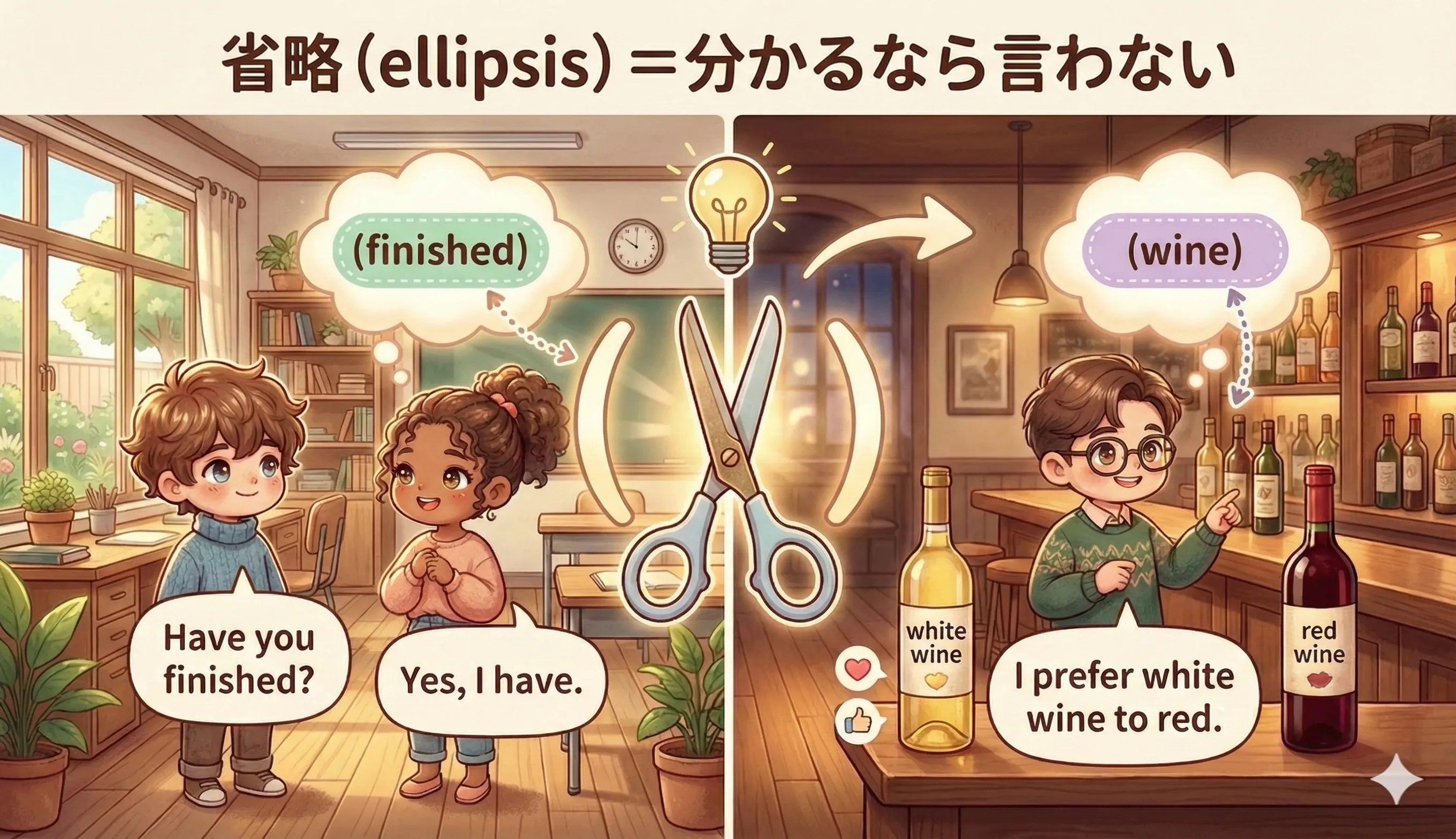
Have you finished? — Yes, I have (finished).
/ I prefer white wine to red (wine).
▮ Section 1 ミニ目次(省略の全体像)✂️🧩
✅ おすすめ順:1-1 → 1-2 → 1-3 → 1-4 → 1-5 → まとめ
📌 合言葉:
「省いても相手が補える?」
(補えないなら省略しない方が安全)
-
↳ 1-1. 省略って何?(かっこで補える感覚)
最初にここ
省略=ズルではなく「分かる部分は言わない」だけ。まず定義とイメージを固めます。
-
↳ 1-2. 省略①:重複を避ける(同じ言葉をくり返さない)
いちばん多い
do / did / have / canなどが“省略のサイン”になりやすいです。 -
↳ 1-3. 省略②:慣用的な省略(そう言うのが自然)
フレーズ
(It’s) Nice to meet you.のように“型として定着”している省略を整理します。 -
↳ 1-4. 省略してOK?NG?(判断のコツ)
要チェック
「相手が1秒で補える?」を基準に、誤解しない省略を身につけます。
-
↳ 1-5. 読むコツ(省略を復元して理解する)
読解・テストで効く!見えない部分を( )で補って読む練習をします。
-
↳ ✅ まとめ:Section 1 のゴール(次に進む準備)
最後にここ
Section 2・3に入る前に「省略の2タイプ」と「見抜き方」を1枚に整理します。
🧩 1-1. 省略って何?(かっこで補える感覚)
英語の省略(ellipsis)は、ひとことで言うと
「同じ言葉をもう一回言わなくても、分かるなら省いてOK」
というルールです😊
日本語でいうと「(言わなくても分かるよね)」の感覚に近いです。
🎨 図でつかむ:省略=「かっこで補える」なら省いてOK
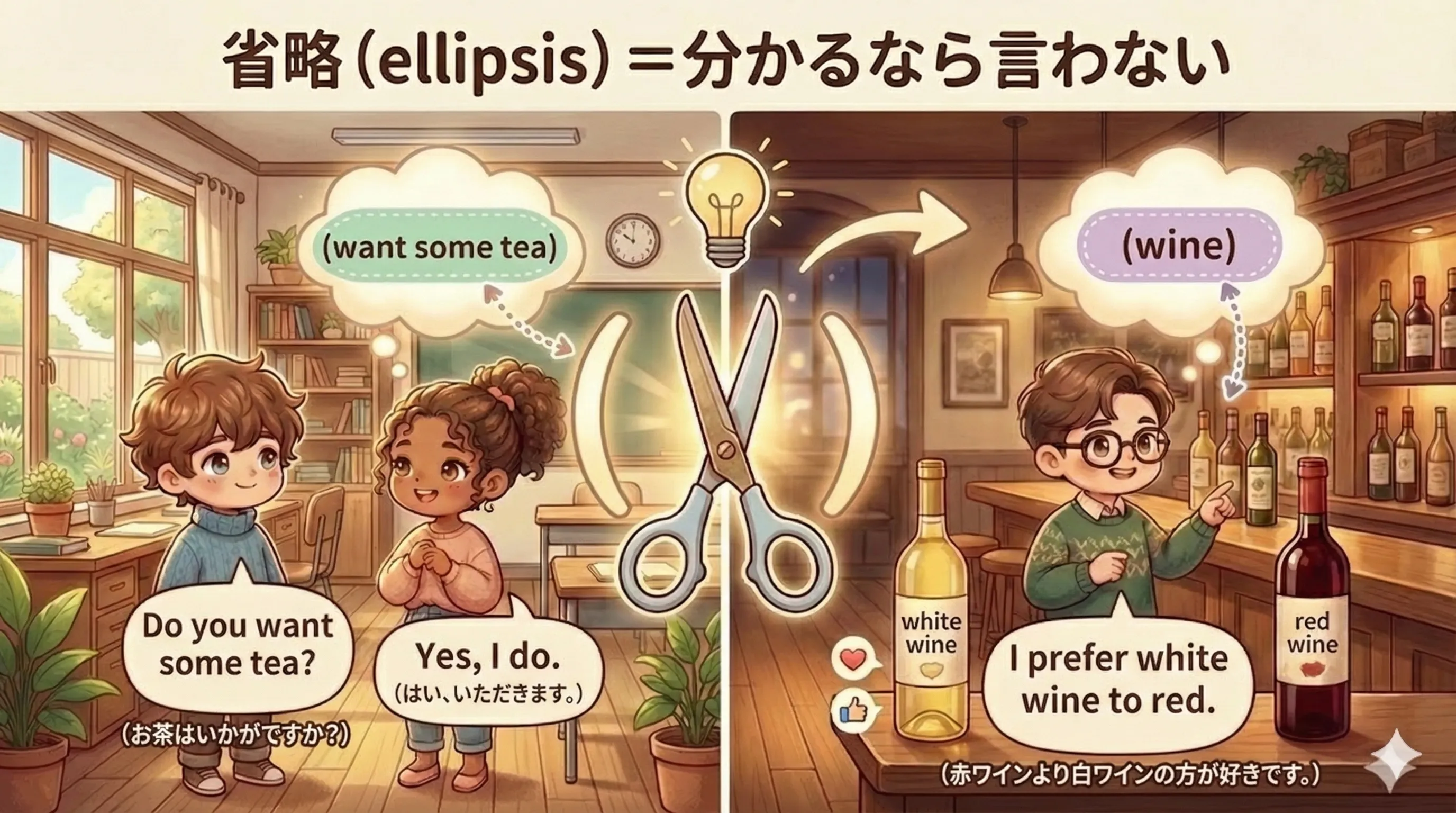
🪜 省略を見抜く3ステップ(読解が速くなる!)
- 省略できるのは、前に出た内容や、 文脈で一つに決まる内容が中心です。
- ( )で補ったときに意味がブレる/不自然なら、無理に省略しないのが安全です⚠️
💬 例文で「かっこで補える」感覚をつかもう
Do you want some tea? — Yes, I do. (want some tea)
(お茶いる?— うん、いるよ。)(= want some tea が省略)
I like the red one better than the blue. (one)
(私は青いのより、赤いほうが好きです。)(= one が省略)
I can swim, but my brother can’t. (swim)
(私は泳げるけど、兄は泳げない。)(= swim が省略)
I don’t want to. (go)
(私は行きたくない。)(= to (go) の省略)
Call me if necessary. (it is)
(必要なら電話して。)(= if (it is) necessary)
No smoking. (is allowed here)
(禁煙。)(= is allowed here が省略)
He likes coffee, and she likes too.
(彼はコーヒーが好きで、彼女も好き…?)※省略しすぎで不自然
He likes coffee, and she does too. (彼はコーヒーが好きで、彼女もそうです。)
「省略してもOK」は、残った形が英語として自然なときだけです😊
合言葉は ( )で自然に補えたらOK です✨
🔁 1-2. 省略①:重複を避ける(同じ言葉をくり返さない)
このタイプの省略は、英語でいちばんよく出ます😊
すでに出た名詞や動詞を、もう一度くり返す代わりに
短い合図(do / did / does / one / so など)
で受けて、文をスッキリさせます。
🎨 図でつかむ:同じ内容は「合図」で受ける
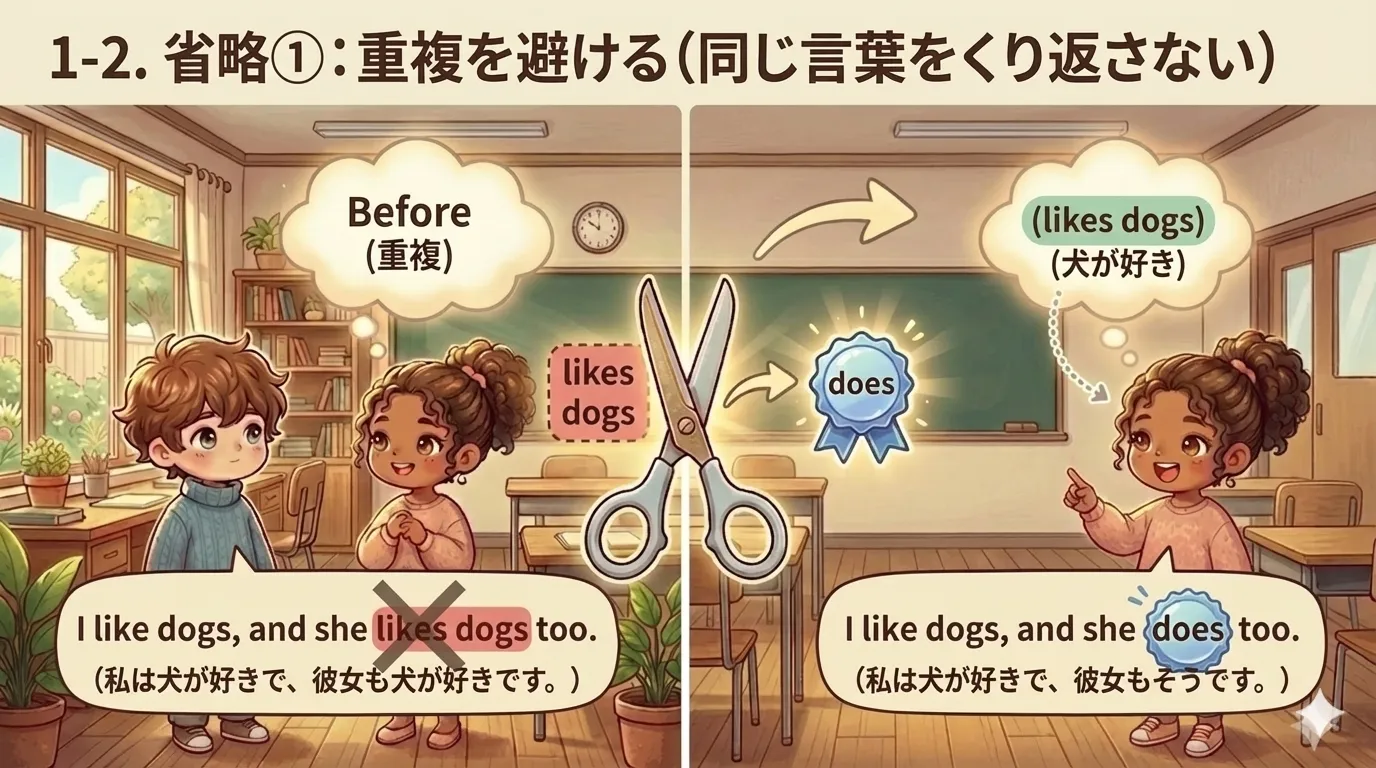
I like dogs, and she does too.(does = likes dogs)
🧩 よくある「省略の合図」まとめ
| 合図 | 何を受ける? | 例(省略あり) | 日本語イメージ |
|---|---|---|---|
✅ do / does / did |
動詞(〜する) | She likes cats, and I do too. | 私もそう(= like cats) |
✅ have / has |
完了・経験など(have + p.p.) | Have you finished? — Yes, I have. | 終わったよ(= finished) |
✅ can / will / must |
助動詞+動詞 | I can swim, but he can’t. | できない(= swim) |
✅ one / ones |
名詞(〜なもの) | I’ll take the red one, not the blue. | 青いの(= blue one) |
✅ so / not |
「そう/そうでない」 | Is it going to rain? — I think so. | そう思う(= it will rain) |
✅ 重複回避の省略:チェック3つ
do / did / one / so などが出たら省略の可能性大✨
💬 例文で感覚をつかもう!(重複回避の省略)
She likes cats, and I do, too (like cats).
(彼女は猫が好きで、私も好きです。)
do は like cats の代わり。くり返しを省いてスッキリ!
I went to the park, and my brother did, too (went to the park).
(私は公園に行って、弟(兄)も行きました。)
did = went to the park(前と同じ動詞句)をまとめて受けます。
I can swim, but my sister can’t (swim).
(私は泳げるけど、姉(妹)は泳げません。)
can’t だけで「泳げない」が分かるので、swim は省略できます。
I’ll take the red one, not the blue (one).
(青いのではなく、赤いのをください。)
one は「同じ名詞(もの)」を受けてくれる便利語!
Is it going to rain? — I think so (it is going to rain).
(雨降りそう?— うん、そう思う。)
so は「前の文の内容」をまとめて受けます(= it’s going to rain)。
Have you eaten? — Yes, I have (eaten).
(もう食べた?— うん、食べたよ。)
eaten を省略できます。
合図(do / did / one / so など) を見つけたら、( )で元の形に戻して意味を確認するとスムーズです😊
🗣️ 1-3. 省略②:慣用的な省略(そう言うのが自然)
ここで扱う省略は「ルールで省く」というより、英語で
そう言うのが自然
だから省略されるタイプです😊
つまり、会話・あいさつ・短い決まり文句でよく出ます。
まずは形ごと覚えるのが近道です✨
🎨 図でつかむ:慣用的省略=「フレーズ化して短くなる」
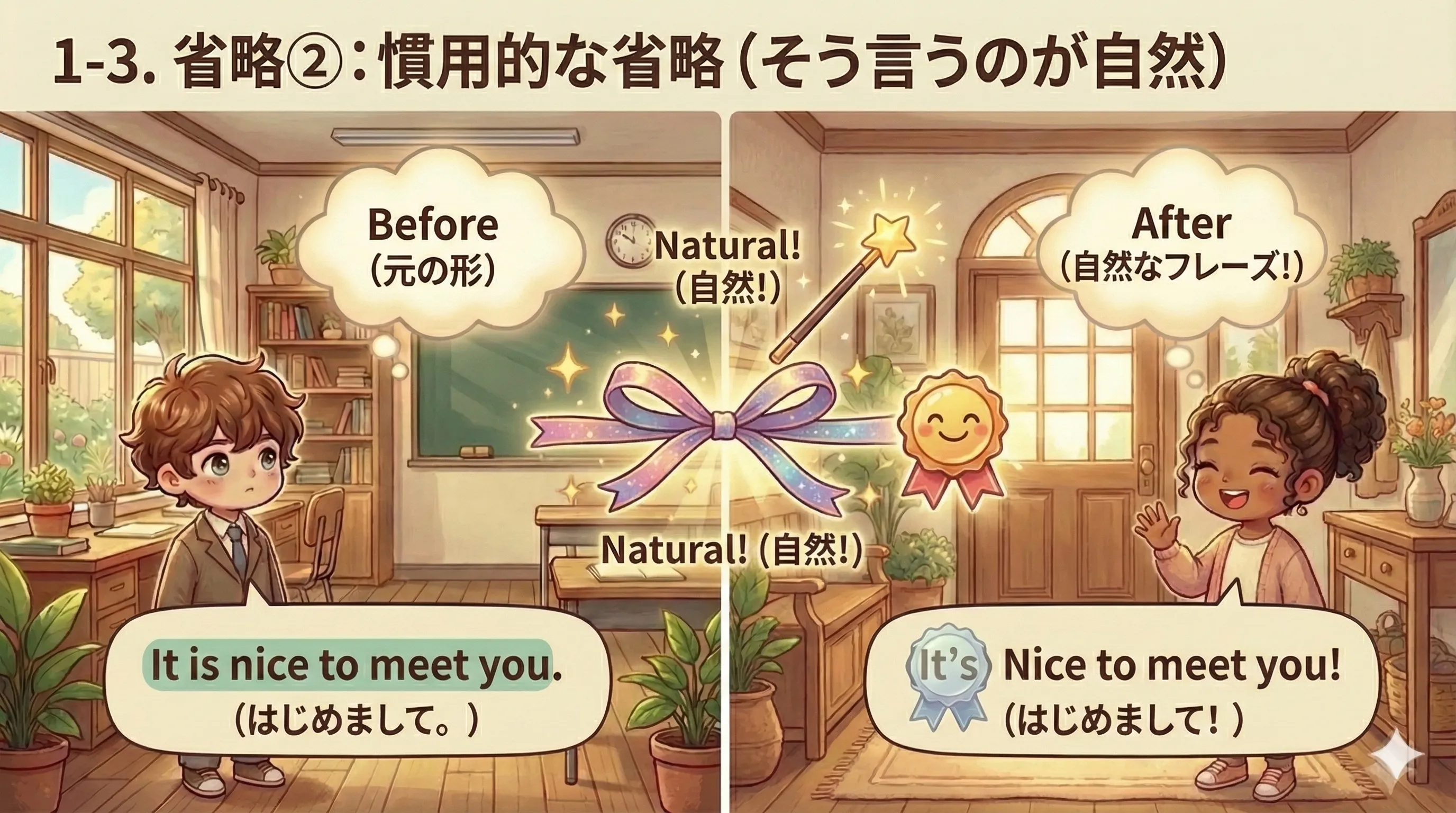
だから、まずは フレーズとして覚える のがコツ😊
🧩 慣用的に省略されやすい形(ざっくり地図)
| 省略されがちな部分 | よくある形(省略後) | 省略前のイメージ | 日本語イメージ |
|---|---|---|---|
✅ It is / It was |
(It’s) Nice to meet you. | It is nice to meet you. |
はじめまして |
✅ There is / There are |
(There’s) No problem. | There is no problem. |
大丈夫だよ |
✅ 主語 + be(従属節) |
When (I was) young, ... | When I was young, ... |
〜のとき |
✅ do you think / do you say |
What about next Sunday? | What do you think about ...? |
〜はどう? |
✅ will happen / does it matter |
What if it rains? | What will happen if ...? |
もし〜なら? |
✅ どっちで言う?(省略あり/なしの感覚)
💬 例文で覚えよう!(慣用的な省略)
(It’s) Nice to meet you.
(はじめまして。)
It’s を言わずに始めることがよくあります。
(There’s) No problem.
(大丈夫だよ/問題ないよ。)
When (I was) young, I lived in Osaka.
(若いころ、私は大阪に住んでいました。)
What about next Sunday?
(次の日曜日はどう?)
What do you think about ...? の省略イメージ。
What if it rains?
(もし雨が降ったらどうする?/どうなる?)
What will happen if it rains? の省略イメージです。
(Keep) Off limits.
(立ち入り禁止。)
ルールで考えるより、よく見る形をフレーズで覚える のがいちばん早いです✨
⚖️ 1-4. 省略してOK?NG?(判断のコツ)
🎨 図でつかむ:OK/NGの分かれ道は「1秒で補える?」
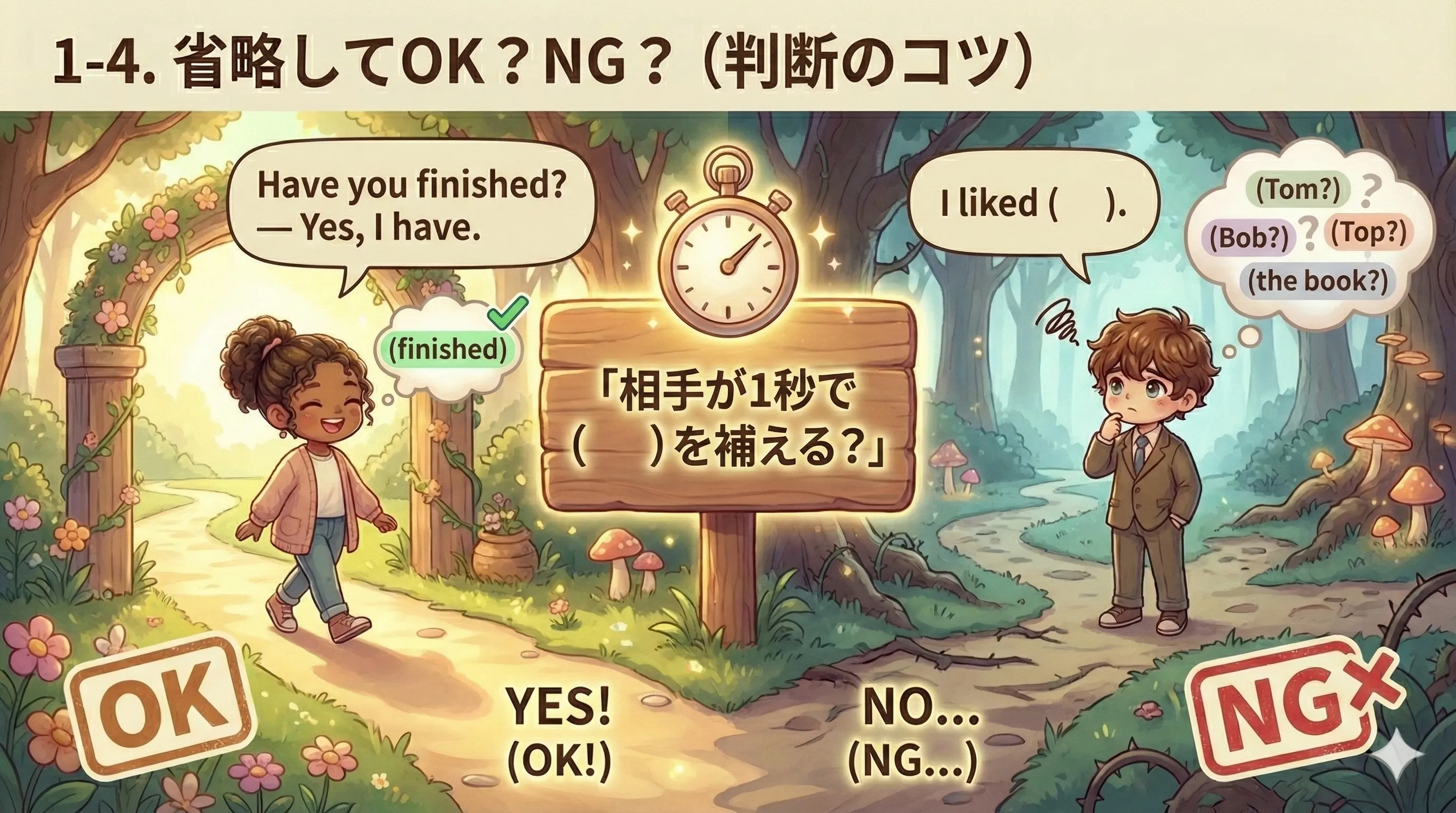
「相手が1秒で( )を補える?」 これでほぼ決まります。
🧭 OK / NG の早見表(迷ったらここ)
| 判定 | こういうとき | 理由 | ひとこと |
|---|---|---|---|
| OK | 直前に同じ内容があり、( )に入る語が一つに決まる | 相手が補える=誤解が起きにくい | 「前に出た内容」なら省略しやすい |
| OK | 会話の返事で、質問の中に答えがほぼ入っている | 省略しても意味がそのまま伝わる | 短く返すのが自然 |
| NG | ( )に入る内容が複数考えられる/誰のことか分からない | 誤解・勘違いが起きる | 「補えない」なら省略しない |
| NG | 初めて出てくる大事な情報(場所・人・理由など)を消してしまう | そもそも情報が足りない | 初出は省略しない |
| 注意 | 書き言葉(ビジネス文・説明文)で省略しすぎる | 読み手の状況が分からないので危険 | 書くときは丁寧に |
🪜 迷ったときの判断フロー(3問だけ)
💬 例文で「OK/NG」を体感しよう!
Have you finished? — Yes, I have (finished).
(終わった?— うん、終わったよ。)
finished があるので、( )は一つに決まります。
He can speak English better than I can (speak English).
(彼は私より英語が上手に話せます。)
speak English を後半でくり返す必要がないので省略OK。
I’ll take the red one, not the blue (one).
(青いのではなく、赤いのをください。)
one を省略しても通じやすいです。
I met Tom and Bob, and I liked ( ).
(トムとボブに会って、私は( )が好きだった。)← 何が好き?誰が好き?が決まらない
Let’s meet at ( ).
(( )で会おう。)← 場所が初出なのに消したら伝わりません
We will send the documents tomorrow, if necessary (it is).
(必要であれば、書類を明日送ります。)
「相手が1秒で( )を補える?」
迷ったら、省略せずに言い切る方が親切で安全です😊
📖 1-5. 読むコツ(省略を復元して理解する)
省略は「書ける/話せる」だけでなく、読めるようになると効果が大きいです😊
英文を読むときは、消えた部分をムリに全部埋める必要はありません。大事なのは
「何が省略されているか」を一瞬で想像できる
ことです✨
🎨 図でつかむ:省略を見つけたら「頭の中で( )を足す」
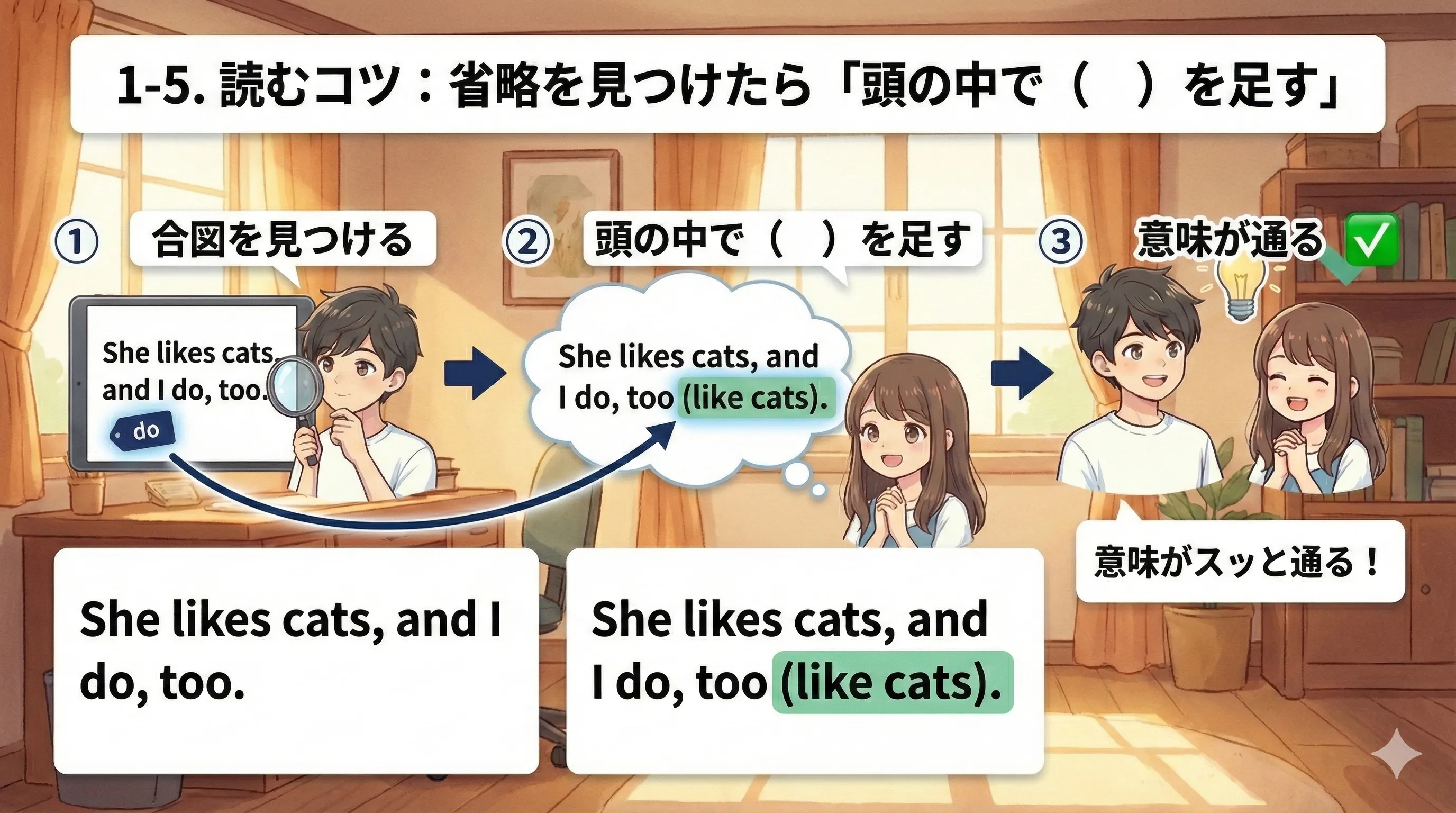
Yes, I have. → (finished)が入る → 「終わったよ」
🧭 読解の4ステップ(1文でやることはこれだけ)
do / did / does, so, one, to, neither など✨
🔎 「省略っぽい!」を見抜く合図(読解用)
| 合図 | 頭の中で足すもの | よくある形 | 読み方のコツ |
|---|---|---|---|
✅ do / did / does |
前の動詞句 | ..., and I do too. | 「私も同じ」 と一気に読む |
✅ so |
前の文の内容 | I think so. | 「そうだと思う」 と丸ごと受ける |
✅ one / ones |
同じ名詞 | the red one | 「〜のほう」 と読んでOK |
✅ to |
直前の動詞 | I don’t want to. | 「〜したくない」 と補う |
✅ neither / nor |
前と同じ否定内容 | Neither do I. | 「私も〜ない」 と即決 |
💬 例文で「復元して読む」練習!
She likes cats, and I do, too (like cats).
(彼女は猫が好きで、私も好きです。)
do を見たら「前と同じ動詞句だ!」→(like cats)を足して読む。
Is it going to rain? — I think so (it is going to rain).
(雨が降りそう?— うん、そう思う。)
so は「前の文の内容」を丸ごと受ける合図です。
I’ll take the red one, not the blue (one).
(青いのではなく、赤いのをください。)
one を見たら「同じ名詞(もの)が省略されてる!」と判断。
I don’t want to (go).
(私は行きたくない。)
to が残ったら「この後の動詞が省略されてるかも」と疑う。
I don’t like spicy food. — Neither do I (like spicy food).
(私は辛い食べ物が好きじゃない。— 私も好きじゃない。)
Neither do I は「私も同じく〜ない」。省略の読み取りが超ラクになります。
He works harder than I do (work).
(彼は私より一生懸命働きます。)
正確に全部復元しなくても、意味が通ればOKです✨
✅ まとめ:Section 1 のゴール(次に進む準備)
Section 1 は、いきなり細かいルールを暗記する章ではありません😊
ゴールはシンプルで、
「省略を見つけたら、頭の中で( )を補って意味が通る」
ところまで到達することです✨
🎨 図でつかむ:Section 1 のゴール=「復元して読める」
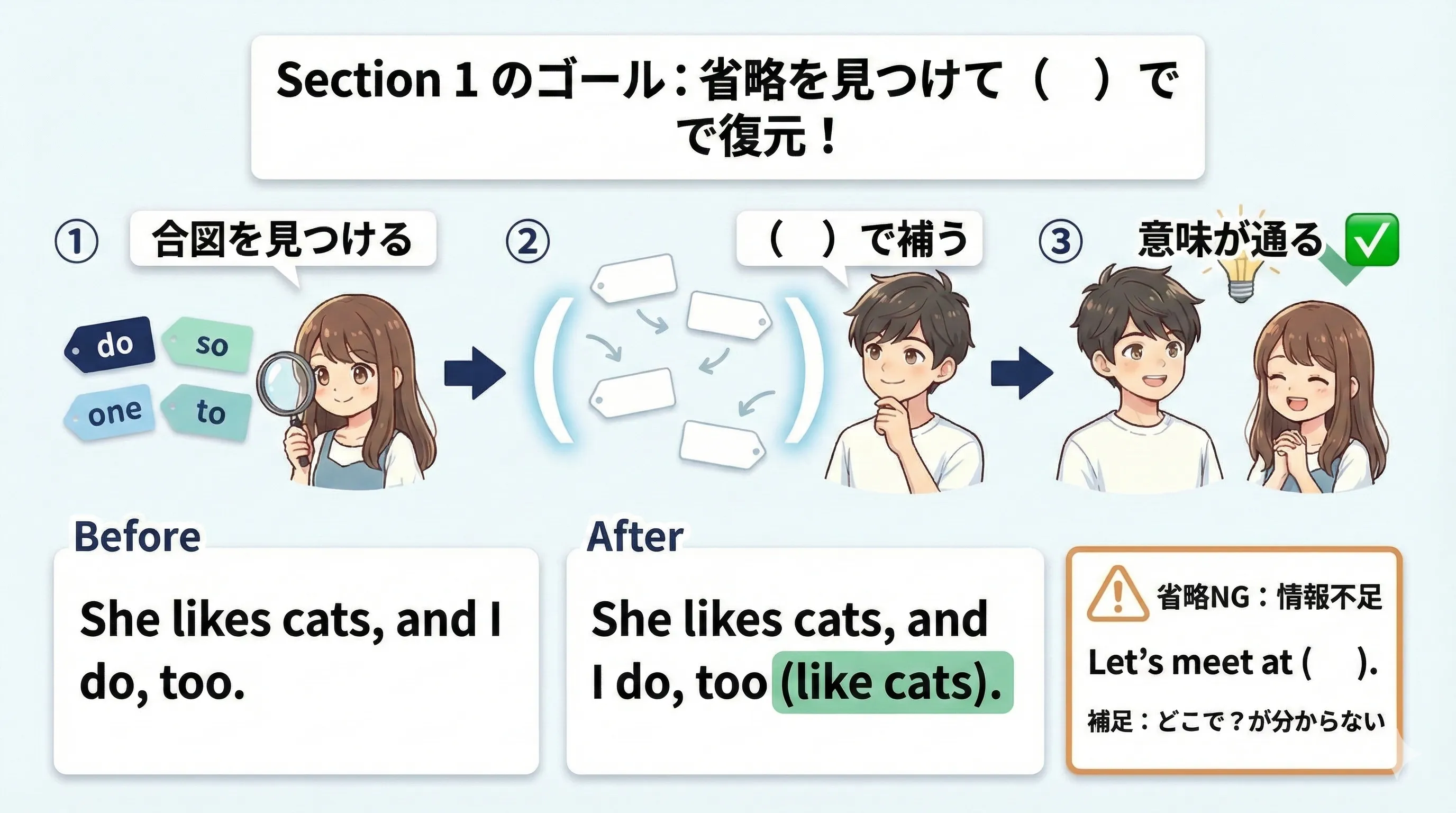
完ぺきに復元しようとせず、意味がスッと通るところまでで十分✨
🎯 Section 1 を終えたら「できている状態」
do / did / does, so, one, to などが目に入る👀
What about ...? / What if ...? などを会話で自然に理解できる🗣️
🧭 次に進む準備:Section 2・3 で何が分かる?
| 次の章 | 学ぶこと | 代表例 | Section 1 とのつながり |
|---|---|---|---|
| Section 2 | 重複を避ける省略を「型」で整理 | do / have / to など |
( )で補える感覚が土台 |
| Section 3 | 慣用的な省略をまとめて覚える | What about ...? / What if ...? |
形で覚えるがそのまま活きる |
次は「どういう型があるか」をまとめていきます😊
💬 仕上げの総復習
She likes cats, and I do, too (like cats).
(彼女は猫が好きで、私も好きです。)
Is it going to rain? — I think so (it is going to rain).
(雨が降りそう?— うん、そう思う。)
I’ll take the red one, not the blue (one).
(青いのではなく、赤いのをください。)
I don’t want to (go).
(私は行きたくない。)
What about next Sunday?
(次の日曜日はどう?)
Let’s meet at ( ).
(( )で会おう。)← 場所が決まらないので省略NG
🚀 次に進む準備、完了!
次は Section 2 で「重複を避ける省略」を型ごとに整理します。
すでに Section 1 で “復元して読める” 状態になっているので、ここから一気に理解がラクになります😊
2. 重複を避けるための省略(ルールで理解できる)
Section 2 は、英語の省略でいちばん多い
「同じ言葉をくり返さない」
パターンを、ルールとして整理していきます😊
合言葉は
「前に出た内容は、合図だけ残して省略できる」
です✨
🧩 図でつかむ:重複は「合図」に置き換える
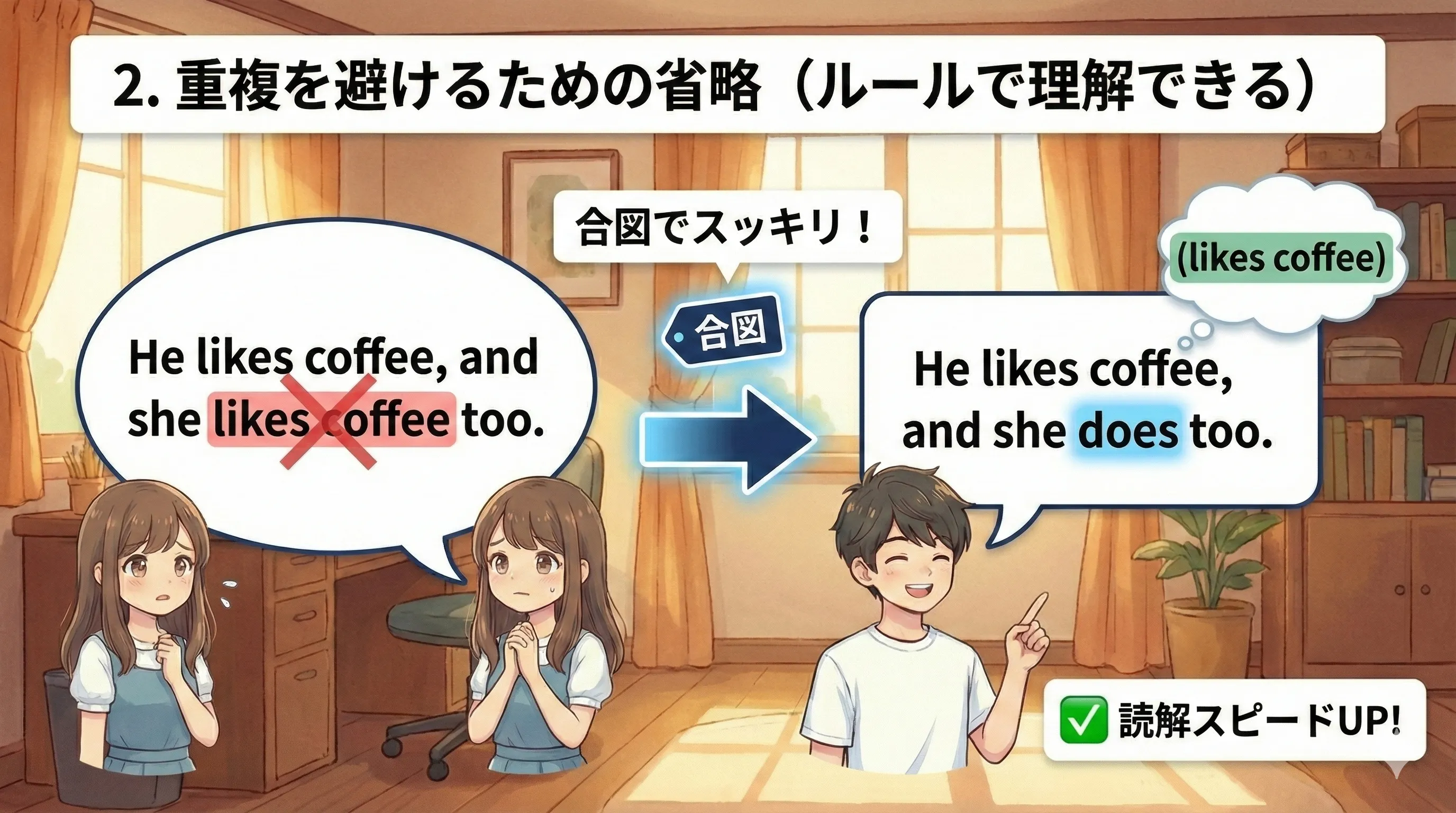
「前に出た内容」 を 「短い合図」 で受けて、くり返しを減らしています✨
Yes, I have. → (finished)が頭の中に戻せるなら読解OK!
▮ Section 2 ミニ目次(重複回避の省略)🔁
✅ おすすめ順:2-1 → 2-2 → 2-3 → まとめ
📌 合言葉:( )で補えるなら省略OK(=前に同じ内容がある!)
-
↳ 2-1. 形容詞のあとにくる(代)名詞の省略
まずここ
red (wine)/gentle (girls)みたいに、同じ名詞を省いてスッキリ✨ -
↳ 2-2. 助動詞の後の動詞の省略
頻出
Yes, I have (finished).のように、答えで同じ動詞句を省略する形💬 -
↳ 2-3. to 不定詞の省略(to だけ残る)
want to (go)のように、同じ動作が分かるならtoだけ残ることがあります🧩 -
↳ ✅ まとめ:Section 2 のゴール(型が見える状態へ)
最後に
「どの合図が、何を受けて省略しているか」を整理して、読解と会話を一段ラクにします😊
🧺 2-1. 形容詞のあとにくる(代)名詞の省略
これは「重複回避」の中でも、特にわかりやすい省略です😊
すでに話題に出た名詞(例:wine, girls)が分かっているなら、
形容詞だけを残して、名詞を省略
できます✨
つまり、英語では 「赤い(ワイン)」 のように言える感覚です。
🎨 図でつかむ:名詞は「分かるなら省略」できる
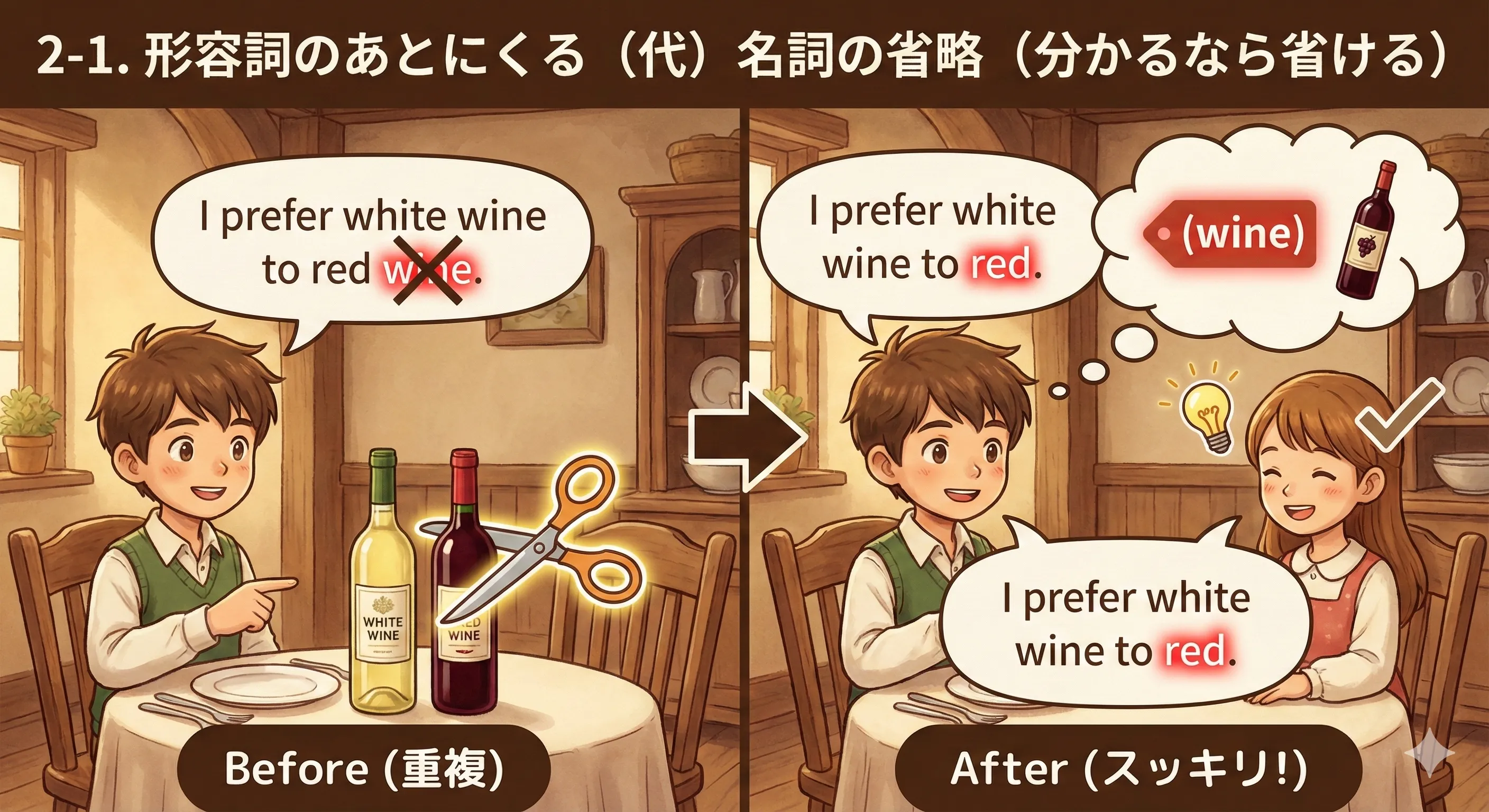
I prefer white wine to red (wine). → 「赤いワイン」
🧩 ルールまとめ(これだけでOK)
| パターン | 省略前(フル) | 省略後(よくある形) | 日本語の感覚 |
|---|---|---|---|
| ✅ 色・性格など + 名詞 | the red wine | the red (wine) | 赤い(やつ) |
| ✅ 複数の形容詞 + 名詞 | gentle and wise girls | gentle and wise (girls) | 穏やかで賢い(子) |
| ✅ 数量 + 名詞 | two dozen people | two dozen (people) | 24人(の人) |
| ⚠️ 初出の名詞 | the red wine | the red ( ? ) | NG寄り |
⚠️ よくある注意(ここだけ気をつけよう)
the red は危険⚠️
💬 例文で感覚をつかもう!(形容詞+(名詞)の省略)
What kind of girls do you like? — Gentle and wise (girls).
(どんな女の子が好き?— 穏やかで賢い(女の子)かな。)
I prefer white wine to red (wine).
(私は赤ワインより白ワインのほうが好きです。)
red の後ろに wine が隠れているイメージ。
I’ll take the blue one, not the black (one).
(黒いのじゃなくて、青いのをください。)
(one) が省略されている感覚(名詞の代わり)。
Two people were injured, and three more (people) were treated.
(2人がけがをし、さらに3人が治療を受けました。)
three more の後ろは(people)と分かるので省略できます。
That movie was exciting, but the ending was sad (ending).
(その映画はワクワクしたけど、最後は悲しい(終わり方)だった。)
Let’s choose the cheaper (option), not the expensive (option).
(高いほうじゃなくて、安いほうを選ぼう。)
英文では「形容詞だけが残る」ので、( )で名詞を補って読みましょう✨
🧠 2-2. 助動詞の後の動詞の省略
ここは省略構文の中でも実用度がとても高いポイントです😊
質問の答えや比較の文で、同じ動詞(+目的語など)をくり返すとき、
助動詞だけ残して、後ろを省略
できます。
例:Yes, I have (finished). のように、have が「終わった」の意味を代表してくれます✨
🎨 図でつかむ:助動詞が「前の動詞句」を受け取る

can / will / have / do など)を見たら、
「前に出た動詞句が省略されてるかも!」
と疑うのがコツです😊
🧩 ルールまとめ(これだけ押さえればOK)
| よく出る場面 | 省略の合図(残るもの) | 省略されるもの(頭の中で補う) | 日本語イメージ |
|---|---|---|---|
| ✅ 短い答え | Yes, I have. |
(finished) / (done it) |
うん、したよ |
| ✅ 比較・as〜as | as clearly as you can |
(read) |
できるだけ〜 |
| ✅ 対比(Aは〜、Bも〜) | and she can, too |
(play the guitar) |
彼女もね |
| ✅ 否定の同意 | neither can she |
(speak French) |
彼女もできない |
⚠️ 注意(ここでつまずきやすいところ)
例:
She can play the guitar, and I can (play the guitar), too.
💬 例文で感覚をつかもう!(助動詞が“前の動詞句”を受ける)
Have you finished? — Yes, I have (finished).
(終わった?— うん、終わったよ。)
have が「finished」を代表してくれます。
She can play the guitar, and I can, too (play the guitar).
(彼女はギターが弾けるし、私も弾けるよ。)
I can't speak French, and neither can she (speak French).
(私はフランス語が話せないし、彼女も話せない。)
neither は「私も〜ない」系の省略が起きやすい合図です。
Read as clearly as you can (read).
(できるだけはっきり読みなさい。)
can を見たら(read)を補う!
I haven't called him, but he has (called me).
(私は彼に電話していないけど、彼は(私に)電話してきた。)
has が「(電話した)」を代表して、後ろを省略しています。
He said he would help, and he did (help).
(彼は手伝うと言って、実際に手伝った。)
did は「前の動作を本当にやった」を短く言える便利表現です。
英文で
can / have / do などが単独で出たら、( )を補って意味を復元しましょう✨
🧲 2-3. to 不定詞の省略(to だけ残る)
英語では、同じ内容をくり返さないために
不定詞の「to」だけ残して後ろを省略
することがあります😊
これは「to が動詞を呼び出すスイッチ🔘」みたいなイメージです。
相手が( )を補える
なら、to だけで通じます✨
🎨 図でつかむ:to が残る=後ろの動詞が省略されてる
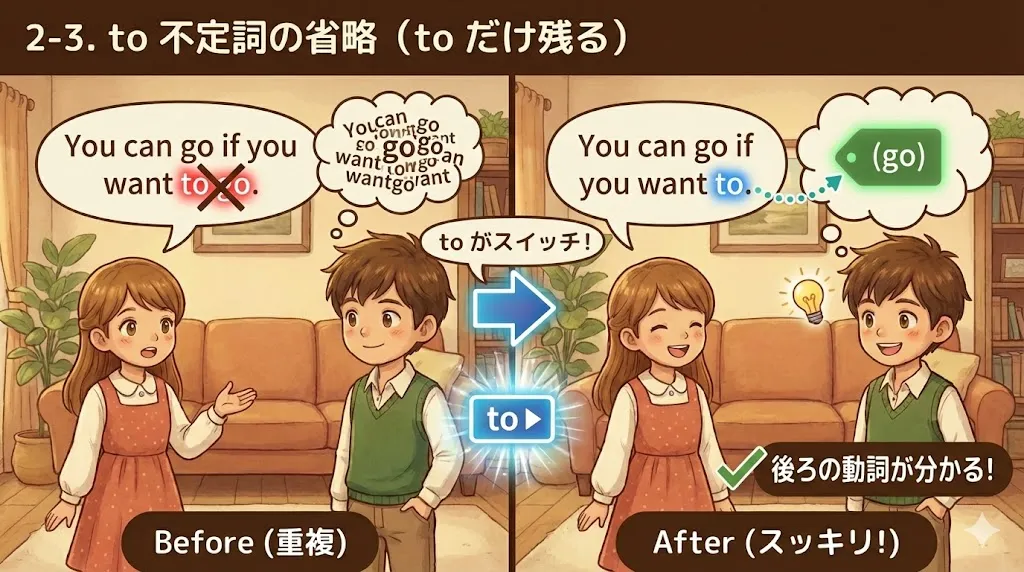
to がポツンと出たら、
「あ、後ろが省略されてる」
のサインです😊
I don't want to. → (go / talk / explain など)を文脈で補う
🧩 ルールまとめ(to 省略の基本パターン)
| よくある形 | 省略後(実際に出る形) | 頭の中で補うもの | 日本語の感覚 |
|---|---|---|---|
| ✅ want to / would like to | I don't want to. |
(go / talk / do it) |
したくない |
| ✅ try to | I tried to, but I couldn't. |
(finish / stop) |
やろうとした |
| ✅ plan to / hope to | I hope to. |
(see you again) |
そうしたい |
| ⚠️ 何をするか不明 | I don't want to. |
( ? ) |
NG寄り |
to だけ残してOK😊
⚠️ 注意(to が残れば何でもOKではない)
I don't want to. だけだと、(何を?)が分からないことがあります😵
to が残ったら、
直前の動詞(go / join / help など)を( )で補って意味を復元しましょう😊
💬 例文で感覚をつかもう!(to だけ残るパターン)
You need not go if you don't want to (go).
(行きたくなければ、行かなくてもいいよ。)
go があるので、(go)が一つに決まります。
I wanted to (go to the party), but I couldn't.
(パーティーに行きたかったけど、行けなかった。)
You promised to (join the club).
(あなた、(そのクラブに入る)って約束したよね。)
to だけで通じます。
Would you like to come with us? — I'd love to (come with you).
(一緒に来る?— ぜひ行きたい!)
I tried to (wake up early), but I couldn't.
(早起きしようとしたけど、できなかった。)
I hope to (see you again).
(また会えたらいいな。)
to だけでも通じます。
to が残る省略は、
「後ろの動詞句は分かるよね?」
という省エネ表現😊文の最後に
to が出たら、( )を補って意味を復元しましょう✨
✅ まとめ:Section 2 のゴール(型が見える状態へ)
Section 2 のゴールは、「省略の文を見たときに、頭の中で( )を足して読める」だけでなく、
どの型の省略かを一瞬で判断できる
状態になることです😊
ここまで来ると、読解も会話も
「え、何が省略?」で止まらない
ので、理解スピードがグッと上がります✨
🎨 図でつかむ:Section 2 の3大パターン(型)
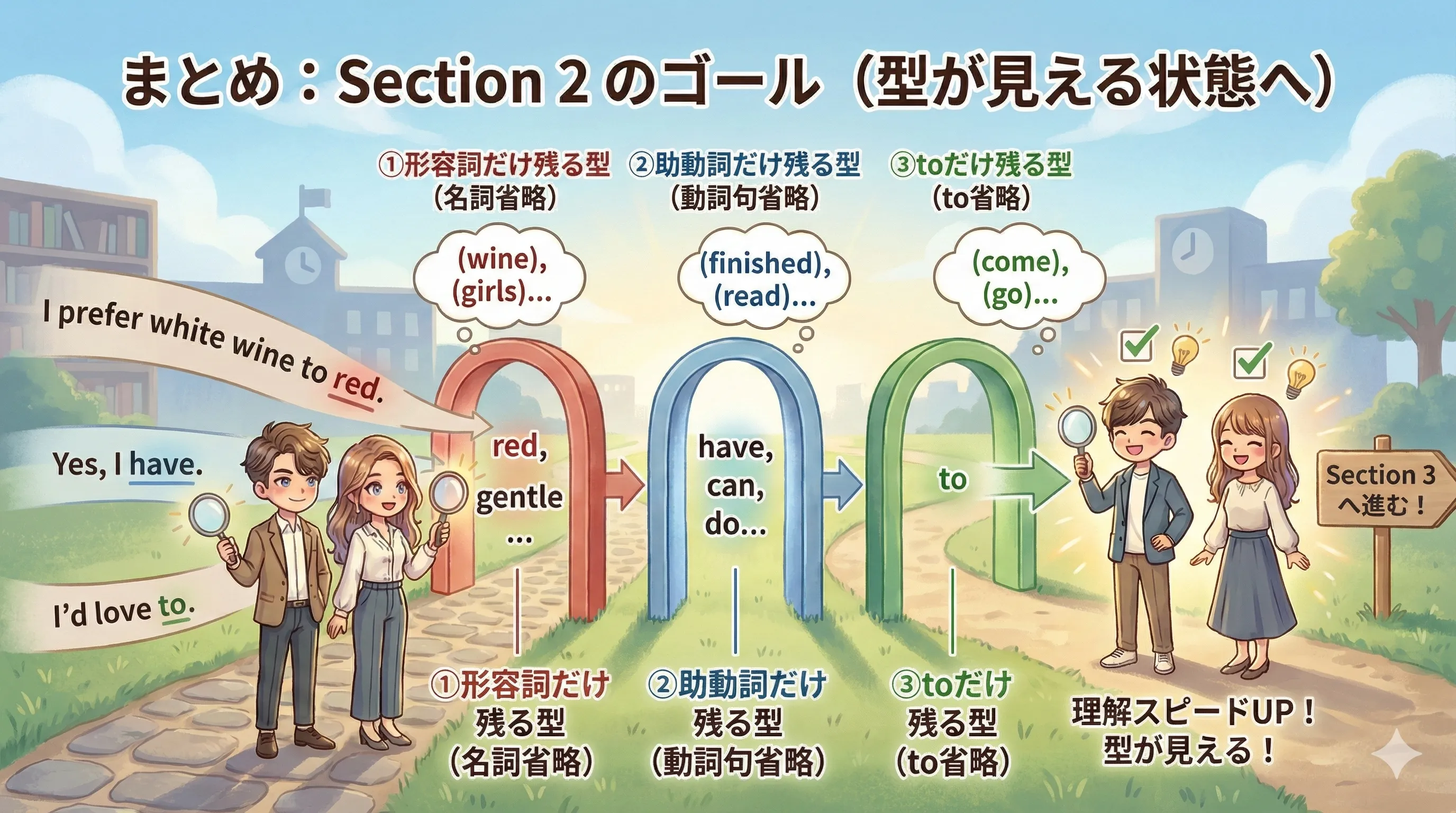
🎯 Section 2 を終えたら「できている状態」
red (wine) のように、名詞を補える😊
Yes, I have. を見て、前の動詞句を復元できる✨
I'd love to. を見て、(come)などを補える😊
🧭 1秒で見分ける:Section 2 の型チェック表
| 型 | 残る“合図” | 省略されるもの | 例(省略形) |
|---|---|---|---|
| 2-1 名詞省略 | 形容詞 | 名詞(同じ話題の名詞) | I prefer white wine to red. |
| 2-2 動詞句省略 | 助動詞 | 動詞(+目的語など) | Have you finished? — Yes, I have. |
| 2-3 to 省略 | to |
to の後ろの動詞句 | Would you like to come? — I'd love to. |
💬 例文でゴール確認!(型が見えるかチェック:5つ以上)
I prefer white wine to red (wine).
(私は赤ワインより白ワインのほうが好きです。)
What kind of girls do you like? — Gentle and wise (girls).
(どんな女の子が好き?— 穏やかで賢い(女の子)かな。)
Have you finished? — Yes, I have (finished).
(終わった?— うん、終わったよ。)
Read as clearly as you can (read).
(できるだけはっきり読みなさい。)
Would you like to come with us? — I'd love to (come with you).
(一緒に来る?— ぜひ行きたい!)
You need not go if you don't want to (go).
(行きたくなければ、行かなくてもいいよ。)
🚀 次(Section 3)へ行く前に、これだけ確認!
- 形容詞だけが残ってたら →(名詞)を補う(2-1)
- 助動詞だけが残ってたら →(動詞句)を補う(2-2)
- 文の最後にtoが残ってたら →(to + 動詞)を補う(2-3)
3. 慣用的な省略(決まり文句で覚える)
Section 3 は「ルールで説明できる省略」というより、
“そう言うのが普通” な決まり文句
をまとめて覚える章です😊
会話・掲示・定型フレーズでよく出るので、
形(セット)で覚える
のが最短ルート✨
🎨 図でつかむ:Section 3 は「丸ごと覚える省略」
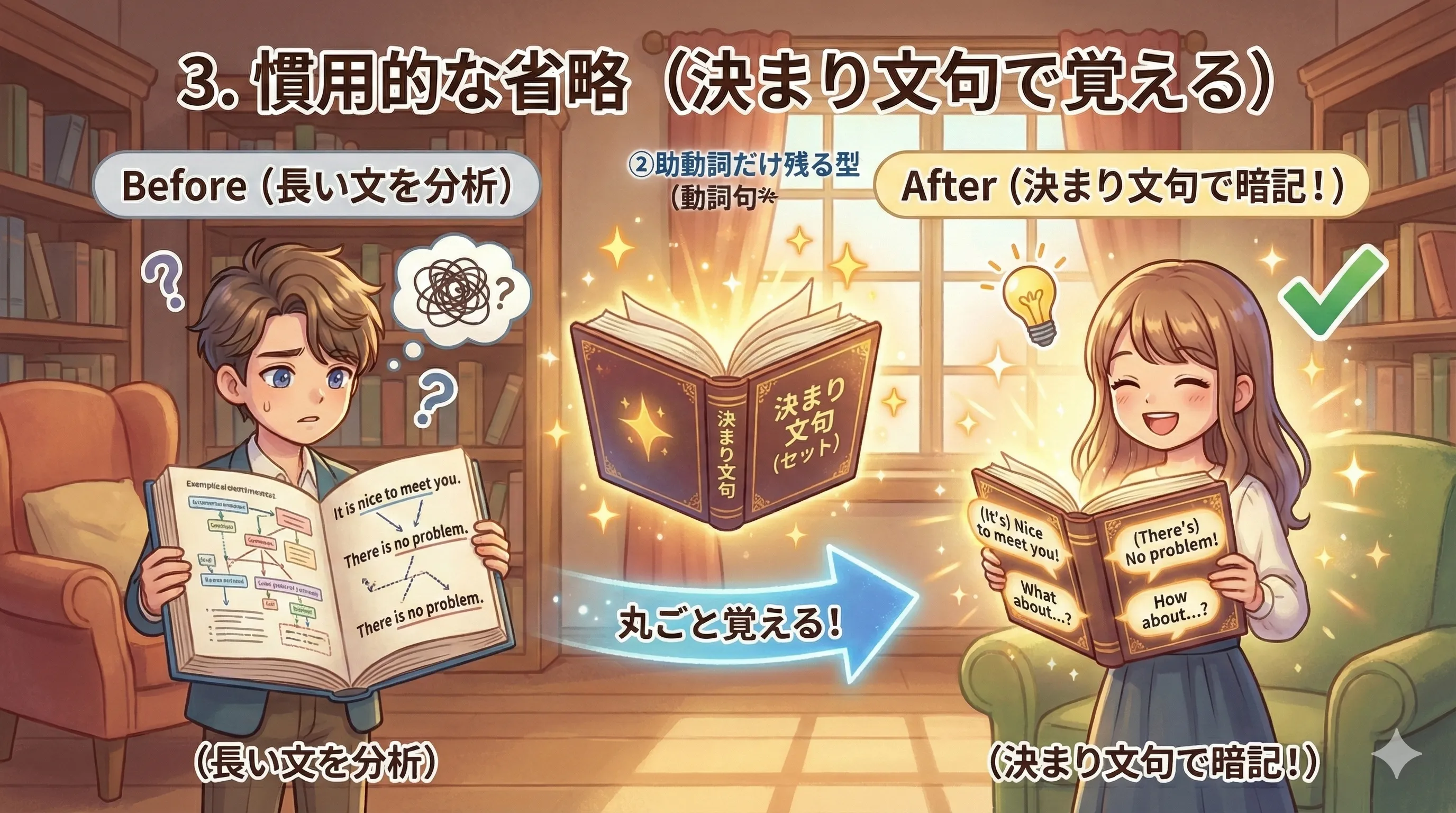
なので、難しく考えずに “決まり文句として暗記” でOKです✨
▮ Section 3 ミニ目次(慣用的な省略)🗣️
✅ おすすめ順:3-3 → 3-4 → 3-2 → 3-1 → 3-5(会話でよく使う順)
📌 合言葉:「意味が分かれば勝ち。形で覚える」😊
-
↳ 3-1. 主語+be動詞の省略(従属節でよく起きる)
When (he was) youngのように、同じ主語ならhe wasが消えることがあります。 -
↳ 3-2. 文頭の「It is / There is」の省略
頻出
(It is) Nice talking to you./(There is) No doubt.のように出だしが省略されます。 -
↳ 3-3. What / How about ~?(~はどう?)
まずここ
会話で超頻出!
What about ...?は「提案・予定の相談」でよく使います😊 -
↳ 3-4. What if / though ~?(もし~なら?/~でも)
会話
What if ...?は「もし〜だったら?」、What though ...?は「だから何?」のニュアンス。 -
↳ 3-5. 簡潔さ(短く言う効果)をねらう省略
掲示・スローガン系:
No smoking./(Keep) Off Limits.など。 -
↳ ✅ まとめ:Section 3 のゴール(定型フレーズが瞬時に読める)
最後に
「省略された形=完成形」として、読んだ瞬間に意味が出る状態を作ります✨
🧩 3-1. 主語+be動詞の省略(従属節でよく起きる)
ここでは、従属節(when / if / unless / as if など)の中で、
主語+be動詞
が省略されるパターンを扱います😊
イメージはシンプルで、
「主語が同じで、言わなくても分かるなら消える」
です✨
🎨 図でつかむ:従属節の中で(主語+be)がスッと消える
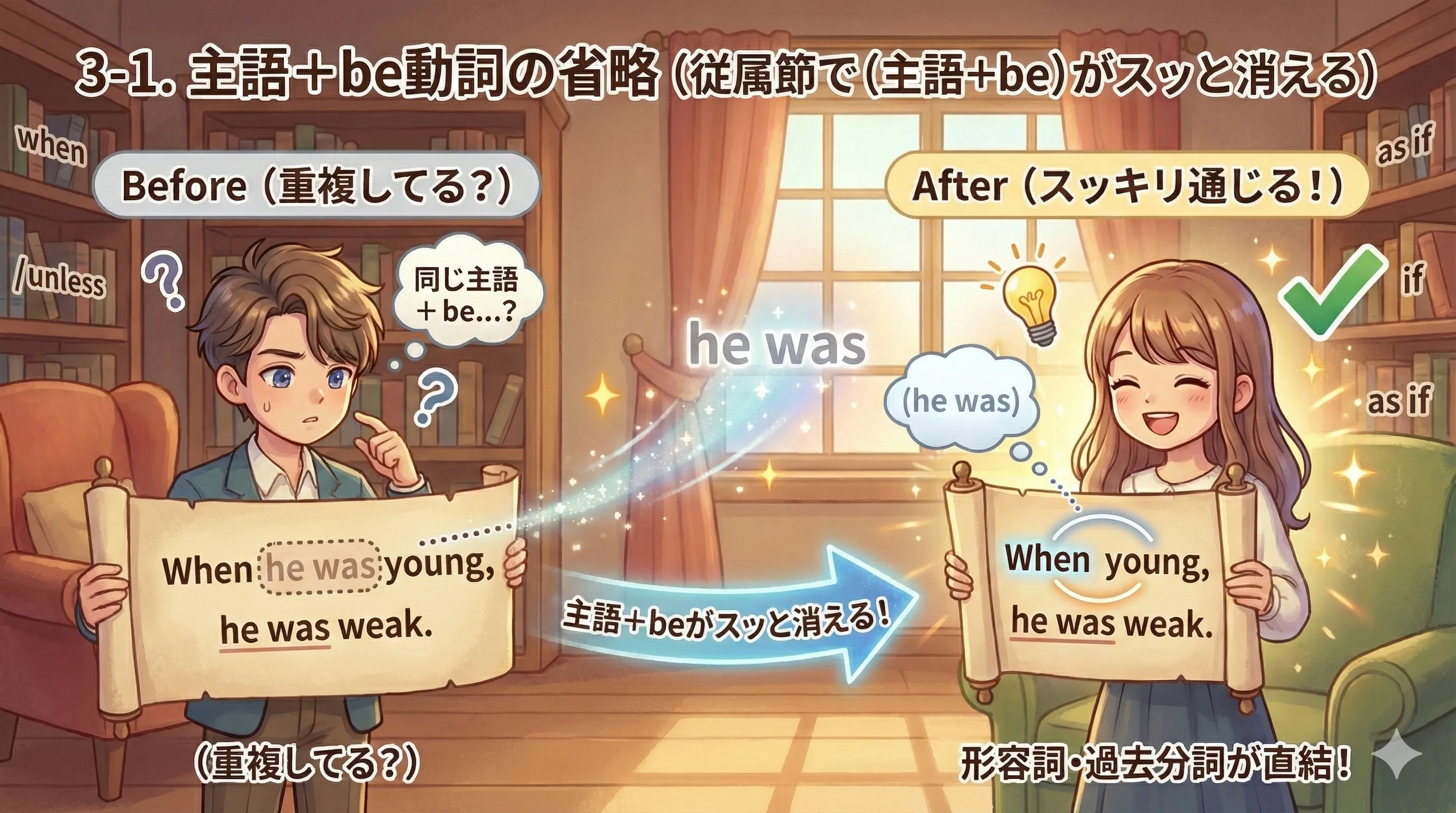
when / if / unless / as if の直後に
形容詞や
過去分詞が来たら、
「あ、主語+beが省略かも!」と気づくのがコツです😊
🧭 ルールまとめ(何が省略される?いつ起きる?)
| よくある形 | 省略前(フル) | 省略後(よく見る形) | ポイント |
|---|---|---|---|
| when 時・状況 | When he was young, ... |
When (he was) young, ... |
形容詞が続く |
| if 条件 | If it is necessary, ... |
If (it is) necessary, ... |
必要なら |
| unless 条件 | unless she is spoken to |
unless (she is) spoken to |
受け身と相性◎ |
| as if 比喩 | as if he were a dead man |
as if (he were) a dead man |
まるで〜 |
⚠️ 注意(省略しない方がいいケース)
💬 例文で感覚をつかもう!(従属節の(主語+be)省略)
When (he was) young, he was weak.
(若いとき、彼は体が弱かった。)
young の前に(he was)が隠れています。
Susan doesn't speak unless (she is) spoken to.
(スーザンは話しかけられない限り、口をきかない。)
spoken(過去分詞)が出たら(be)が省略されてるかも!
He was sleeping as if (he were) a dead man.
(彼はまるで死人のように眠っていた。)
as if は(主語+be)省略が起きやすい定番です。
You have to go there, if (it is) necessary.
(必要なら、君はそこへ行かなくてはならない。)
if の後に形容詞(necessary)が直で来たら省略サイン。
Correct errors, if (there are) any (errors).
(もし誤りがあるなら、訂正しなさい。)
if any は「もしあるなら」の決まり文句に近い省略です。
When (you are) ready, press the button.
(準備ができたら、ボタンを押してね。)
When ready のようにさらに短くなることもあります😊
when / if / unless / as if の後ろに形容詞や過去分詞が来たら、(主語+be)を補って読みましょう✨
🪄 3-2. 文頭の「It is / There is」の省略
英語では、文頭の It is / There is が
「言わなくても分かる」
とき、サラッと省略されることがあります😊
特に、あいさつ・感想・決まり文句でよく起きます。
省略形は短いけれど、意味はちゃんと「〜だね」「〜がある(〜だ)」のままです✨
🎨 図でつかむ:出だし(It is / There is)が消えても意味はそのまま
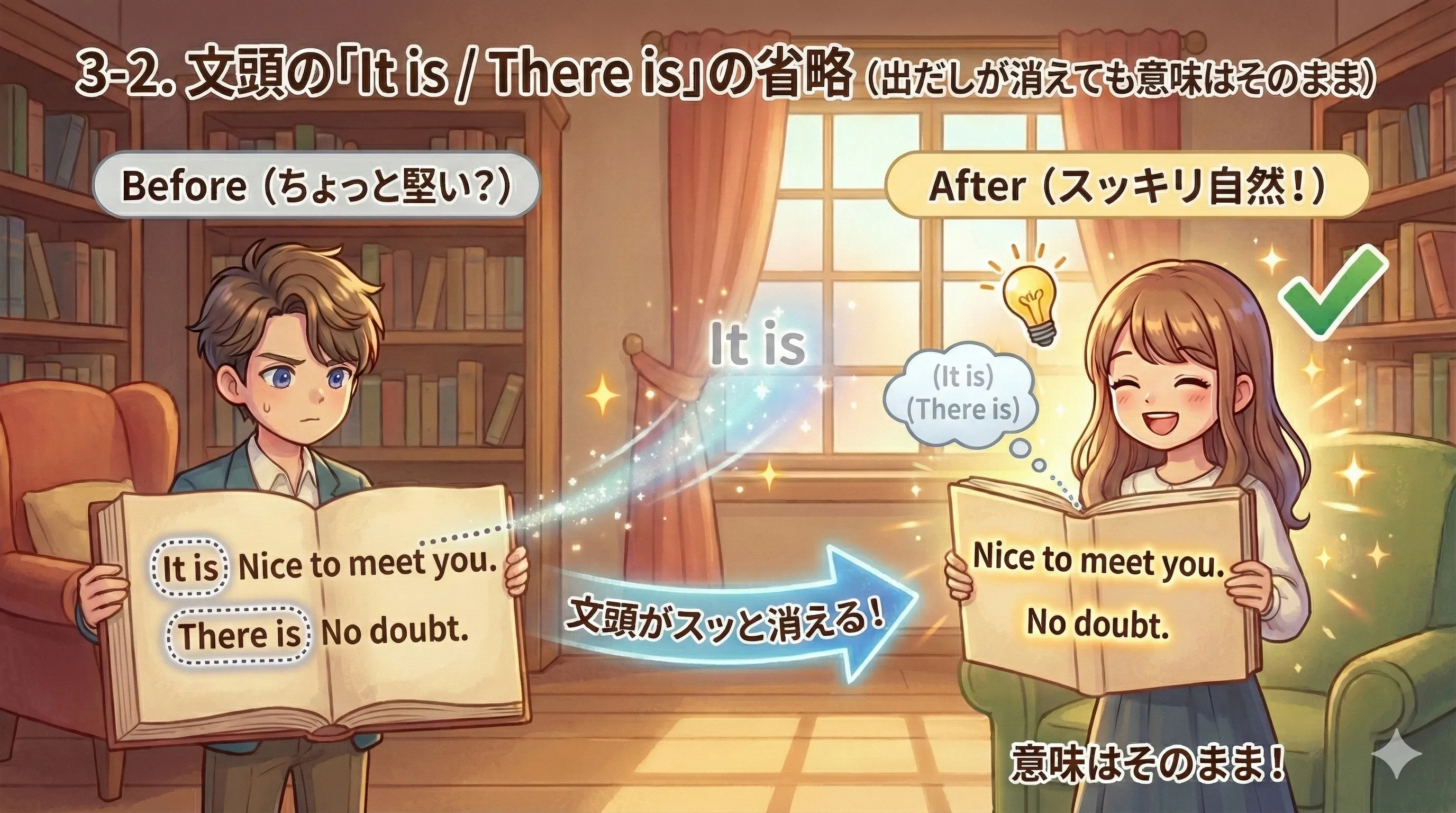
🧩 ルールまとめ(この3つが分かればOK)
| よくある型 | 省略前(フル) | 省略後(よく見る形) | 場面 |
|---|---|---|---|
| It is + 形容詞 | It is strange that ... |
(It is) strange that ... |
感想 |
| It is + 評価 | It was nice talking to you. |
(It was) nice talking to you. |
あいさつ |
| There is + 名詞 | There is no doubt. |
(There is) no doubt. |
断言 |
⚠️ 注意(省略は“自然な場面”で)
Nice / Strange / No doubt なら、
(It is)/(There is)を補って読むとスッと理解できます✨
💬 例文で感覚をつかもう!(文頭省略の定番)
(It is) Strange (that) we should meet here.
(こんなところで会うなんて不思議ですね。)
(It was) Nice talking to you.
(お話しできて楽しかったです。)
(There is) No doubt about it.
(それについては疑う余地はありません。)
(It is) Important to stay calm.
(落ち着いていることが大事です。)
(There is) No need to rush.
(急ぐ必要はありません。)
(It is) A pity you couldn't come.
(来られなかったのは残念です。)
文がいきなり形容詞や名詞から始まったら、(It is)/(There is)を補って読めばOKです✨
💡 3-3. What / How about ~?(~はどう?)
What about ...? と How about ...? は、会話で「提案」「相談」「別案」を出すときの定番です😊
実はもともと
What do you think about ...?
などの長い形が省略されて、今の短い形が「普通」になっています✨
ポイントは、文の形(後ろに何を置くか)を覚えることです!
🎨 図でつかむ:長い形が短くなって「決まり文句」になった
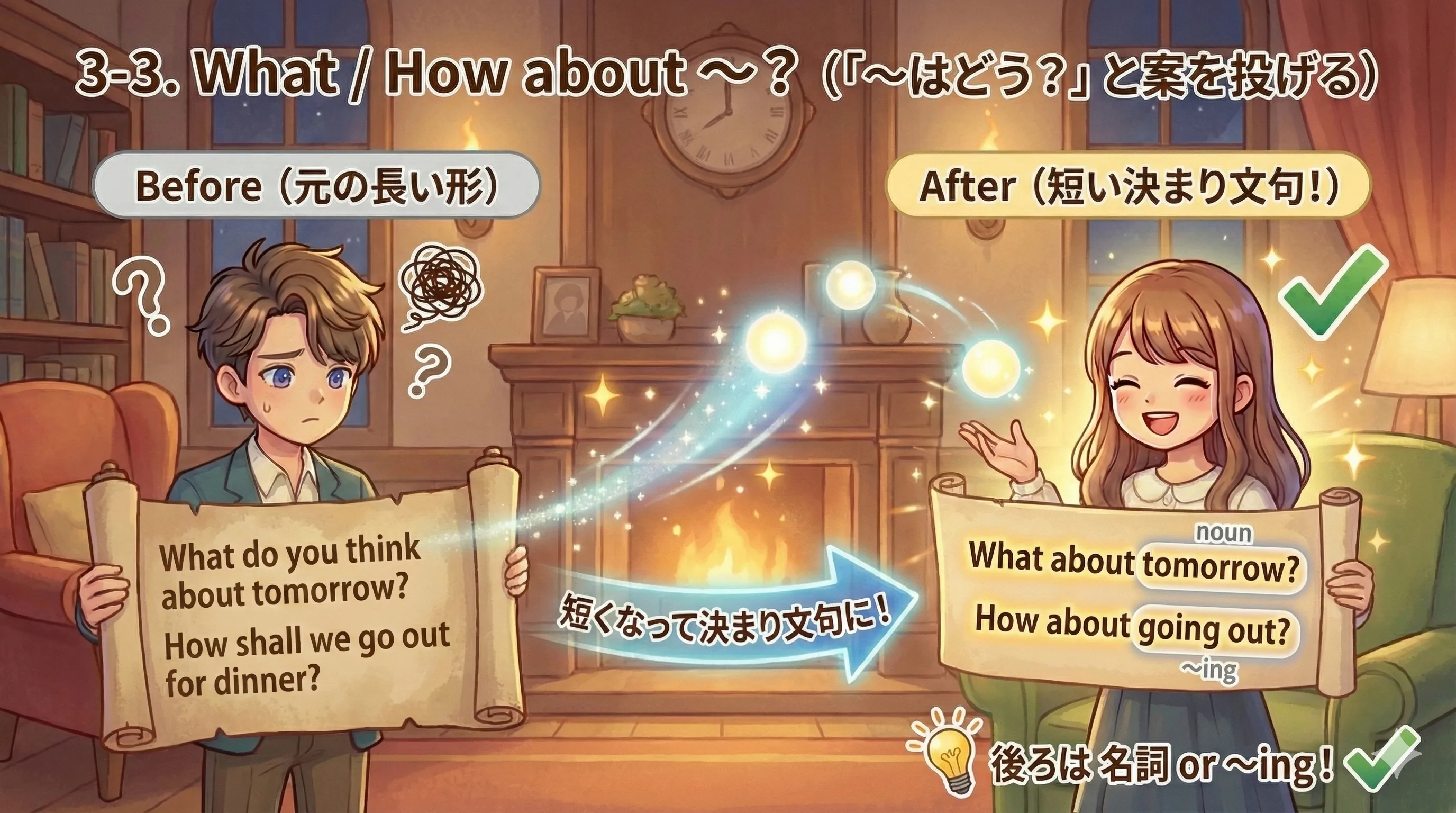
後ろは 名詞 または 〜ing(動名詞) が定番です。
🧩 使い分けと形(ここだけ押さえればOK)
| 言い方 | 後ろの形 | よく使う場面 | 例(短い形) |
|---|---|---|---|
| What about | 名詞 / 代名詞 | 別案・条件の追加(「〜は?」) | What about tomorrow? |
| How about | 〜ing(動名詞) | 提案(「〜するのは?」) | How about going out? |
| どっちでもOK | 名詞 / 〜ing | ふつうの会話では違いは小さめ | What/How about lunch? |
about の後ろは「話題(テーマ)」です😊だから 名詞 or 〜ing が自然になります。
⚠️ 注意(ミスしやすいところ)
How about go out?○
How about going out?
What/How about ...? は、相手に
“どう思う?”
をやさしく投げる言い方です✨
💬 例文で感覚をつかもう!(What / How about)
What about next Sunday?
(今度の日曜日はどう?)
How about going out for dinner?
(夕食に出かけるのはどう?)
We can meet at 3. What about 4?
(3時に会えるよ。4時はどう?)
How about taking a short break?
(少し休憩するのはどう?)
What about lunch first?
(まずランチはどう?)
How about trying this app?
(このアプリ試してみるのはどう?)
What/How about ...? は「〜はどう?」の定番😊後ろは 名詞 または 〜ing が自然です✨
🧠 3-4. What if / though ~?(もし~なら?/~でも)
What if ...? は「もし〜だったらどうなる?」という心配・確認の質問😊
What though ...?(または What if ... though? の形)は、
「(たとえ〜でも)だから何?」「それがどうしたの?」という開き直り・反論のニュアンスが出ます🔥
もともとは What will happen if ...? などの長い形が省略されて、
今の短い形が定番になっています✨
🎨 図でつかむ:心配(What if) vs 反論(What though)
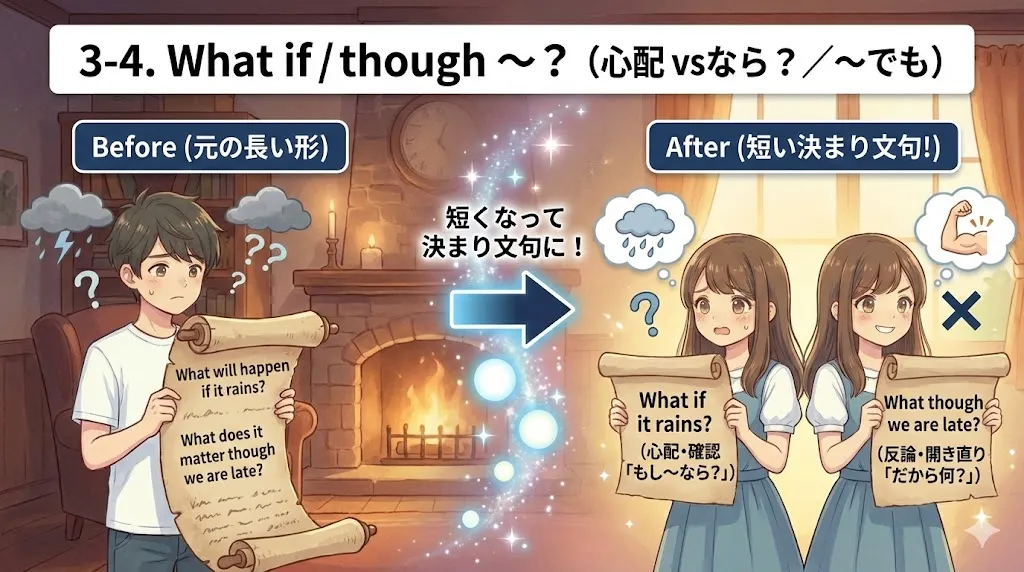
🧩 形と意味(ここだけ押さえればOK)
| 表現 | だいたいの元の形 | 気持ち(ニュアンス) | 超ざっくり訳 |
|---|---|---|---|
| What if + 文? | What will happen if ...? |
心配・確認/想定外のリスクを考える | 「もし〜ならどうする?」 |
| What though + 文? | What does it matter though ...? |
反論・開き直り/気にしない姿勢 | 「たとえ〜でも、だから何?」 |
What if + 文 + though? |
会話の省略(混ざる形) | 「〜でもいいじゃん?」のニュアンス | 「〜でも、別にいいよね?」 |
⚠️ 注意(言い方の温度感)
What if を見たら「条件の心配」、though を見たら「反論っぽい」方向で気持ちを読むと自然です✨
💬 例文で感覚をつかもう!(What if / though)
What (will happen) if there's a power failure now?
(今、停電があったらどうなるの?)
What will happen if ...? の省略です。
What if we miss the last train?
(終電に乗れなかったらどうする?)
What if he doesn't answer the phone?
(彼が電話に出なかったらどうする?)
What (does it matter) though we are amateurs?
(素人だって、それがどうしたの?/だから何?)
What if I'm late, though?
(でも、遅れたらどうするの?/遅れても大丈夫?)
though を添えると「ちょい反論・気がかり」っぽさが出ます。
What if we meet online instead?
(代わりにオンラインで会うのはどう?)
What if we ...? は「提案」っぽく使われることもあります😊
What if ...? は「もし〜ならどうする?」(心配・確認)😊What though ...? は「たとえ〜でも、だから何?」(反論・開き直り)になりやすい🔥どちらも、長い文の省略が「決まり文句」になった形です✨
⚡ 3-5. 簡潔さ(短く言う効果)をねらう省略
ここでは、「省略しても意味が通じる」だけじゃなく、
短く言うことで“強く・分かりやすく”する
ための省略を扱います😊
看板・注意書き・あいさつ・スローガンなどは、長く書くより
短い方がパッと伝わる
ので、省略がよく使われます✨
🎨 図でつかむ:掲示は「短い=見やすい」
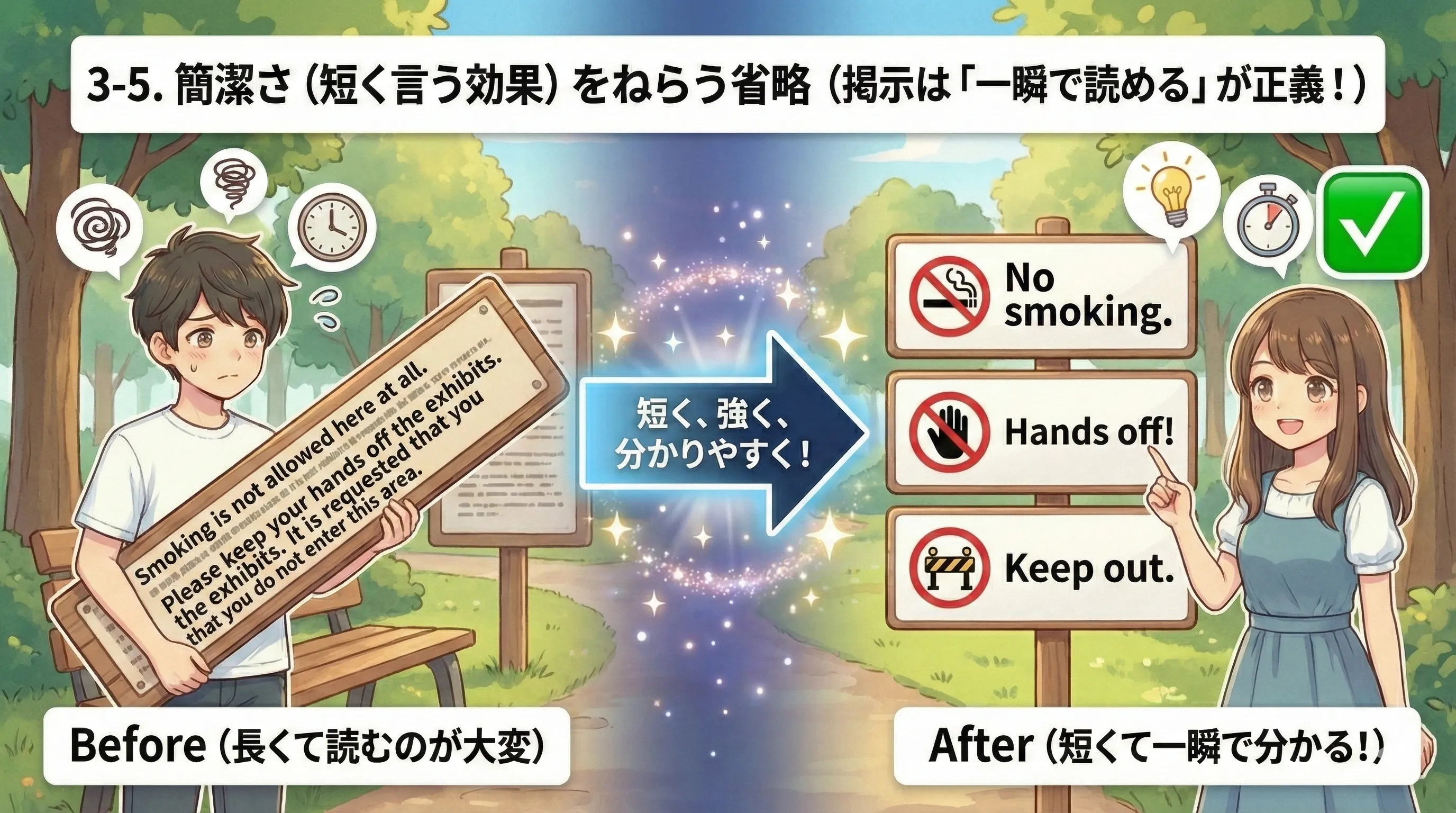
だから、主語や be 動詞、目的語などが バッサリ省略されやすいです。
🧩 どこが省略されてる?(典型パターン)
| よく見る表現 | 省略前(イメージ) | 日本語の感じ | 使う場面 |
|---|---|---|---|
No smoking. |
No smoking (is allowed here). |
「禁煙」 | 掲示 |
Off limits. |
(Keep) off (the) limits. |
「立入禁止」 | 注意 |
No entry. |
(There is) no entry. |
「立入禁止」 | 入口 |
Hands off. |
(Keep your) hands off (it). |
「触るな」 | 警告 |
⚠️ 注意(会話でそのまま言うと強すぎることも)
No entry. は強い禁止の響き。人に言うなら丁寧にするのが安全です😊
💬 例文で感覚をつかもう!(掲示・定型の省略)
No smoking.
(禁煙。)
Off limits.
(立ち入り禁止。)
No entry.
(立ち入り禁止。)
Hands off!
(触るな!/手を出すな!)
Keep out.
(立ち入り禁止。)
(I wish you) A happy new year.
(新年おめでとう。)
省略形が「完成形」になっているので、(省略前を全部補う)より意味を即キャッチするのがコツです✨
✅ まとめ:Section 3 のゴール(定型フレーズが瞬時に読める)
Section 3 は「ルールで考える」より、
“決まり文句をそのまま理解する”
練習でした😊
ゴールはシンプル!
見た瞬間に意味が出る
+
必要なら( )で補って読める
ことです✨
🎨 図で復習:定型フレーズは「丸ごと」→ 足りなければ( )で補う
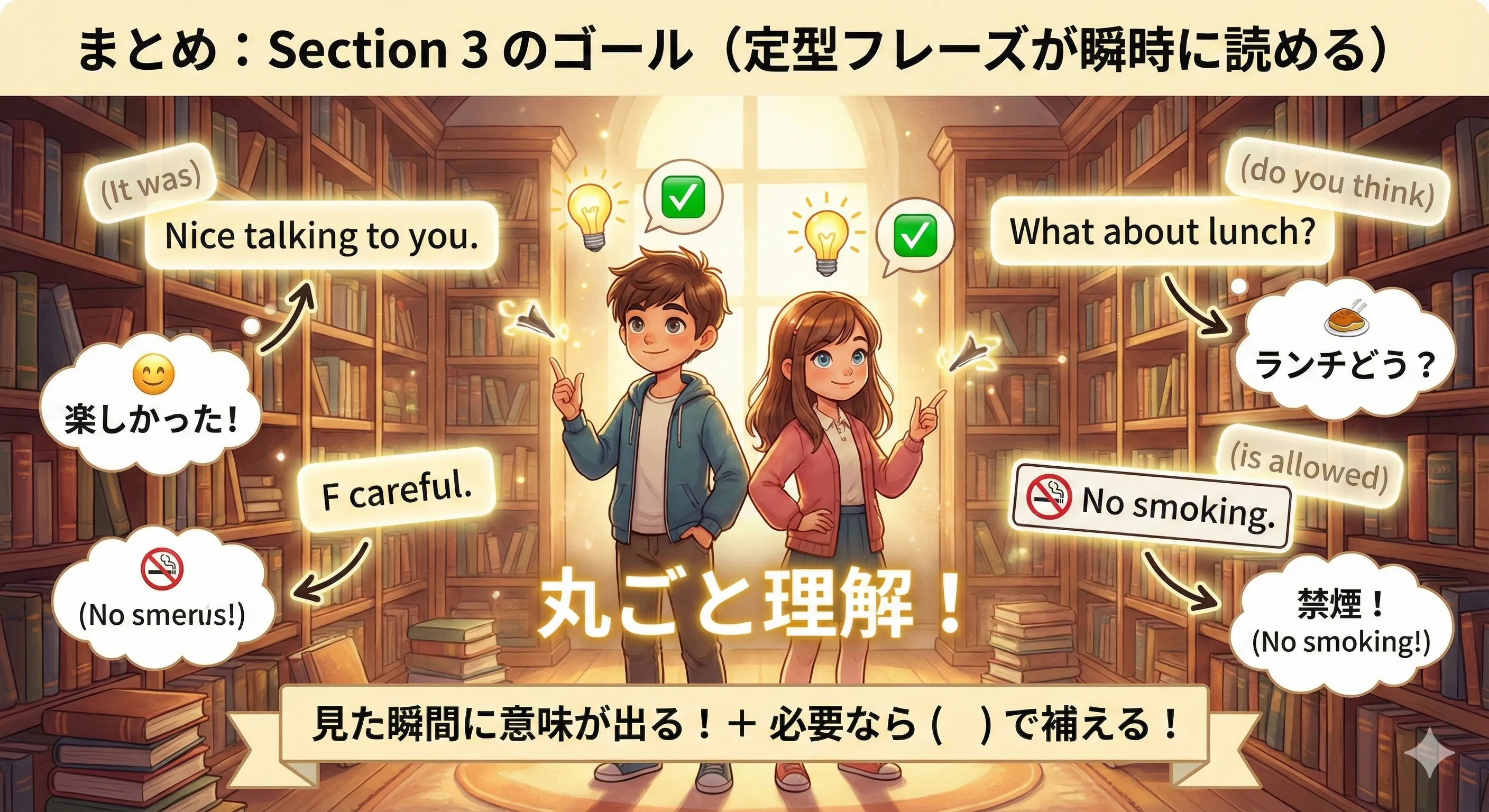
つまずいたら ( )で補って理解を確定✨
🎯 Section 3 ゴール:できたら合格!
(It is) / (There is) の文頭省略、What about の提案、掲示の No ~ などを見分けられる😊
Nice talking to you. → (It was) nice ... のように、必要なら( )で補って意味を固められる✨
What though ...? は反論っぽい、掲示の省略は強め、などニュアンスが取れる😊
🗺️ Section 3 早見表(瞬時に意味が出るように)
| 見た目(合図) | 代表フレーズ | 瞬間日本語(目安) | ( )で補うと? |
|---|---|---|---|
| 文頭省略 | (It is) Strange ... |
「不思議だね」 | It is strange ... |
| There 省略 | (There is) No doubt. |
「疑いない」 | There is no doubt. |
| 提案 | What/How about ...? |
「〜はどう?」 | What do you think about ...? |
| 心配 | What if ...? |
「もし〜なら?」 | What will happen if ...? |
| 掲示 | No smoking. |
「禁煙」 | No smoking is allowed. |
💬 例文で“瞬間読み”チェック!(Section 3)
(It was) Nice talking to you.
(お話しできて楽しかったです。)
(There is) No doubt about it.
(それについては疑う余地はありません。)
What about next Sunday?
(今度の日曜日はどう?)
How about taking a short break?
(少し休憩するのはどう?)
What if we miss the last train?
(終電に乗れなかったらどうする?)
No smoking.
(禁煙。)
➡️ 次に進む前に(30秒)
定型フレーズは「考える」より「見た瞬間に分かる」まで回すのが近道です😊
つまずいたら、(It is)/(There is)/(do you think)を
( )で補う
→ 意味が確定したら、次は補わずに読めるようにしていきましょう✨
🧾 まとめ:省略構文の要点チェック
省略構文は、英語が「伝わるなら短くする」ための工夫です😊
ゴールはたった2つ!
① どこが省略されたか見抜く →
② 頭の中で補ってスッと理解する✨
🎨 図で復習:省略を見つけたら( )で補う
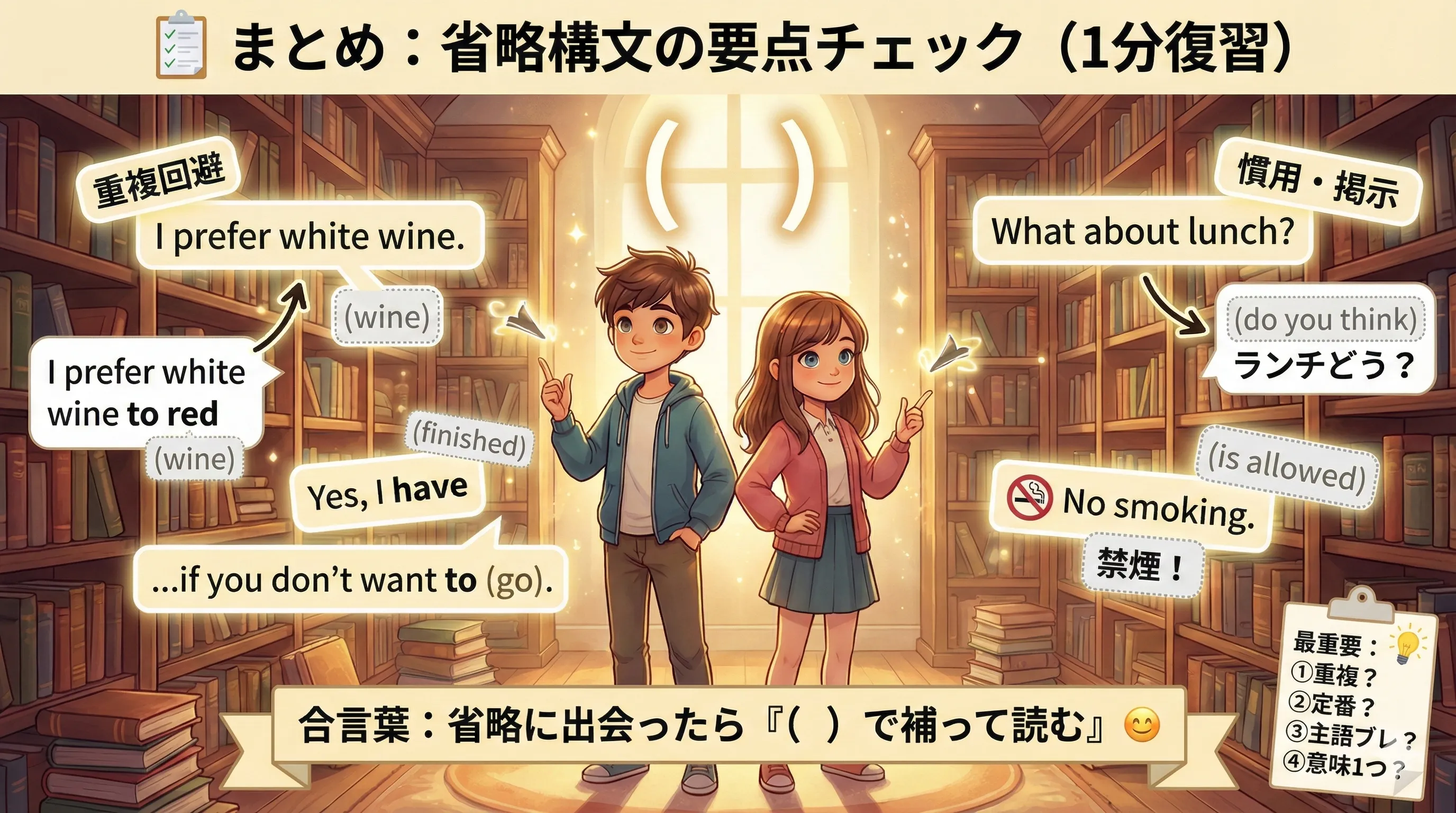
たとえば
Yes, I have. は
Yes, I have (finished). と考えると一瞬で意味が取れます✨
✅ 省略構文:最重要チェックポイント
red (wine) / I have (finished) のように、同じ名詞・動詞が繰り返されると省略されやすい😊
What about ...? / No smoking. など、省略形が完成形として定着しているもの✨
🗺️ パターン別まとめ(どれに当てはまる?)
| タイプ | 省略の中身(よく消える) | 見抜きサイン | 例 |
|---|---|---|---|
| 重複回避 | 同じ 名詞 / 動詞句 | 同じ語が2回出そう | red (wine) |
| 助動詞の後 | 動詞+目的語など | Yes, I have. の形 |
I have (finished) |
| to だけ残る | to (V ...) の V 以下 |
want to / try to などの後 |
want to (go) |
| 慣用 | 文頭の語・長い前置き | 会話の定番で短い | What about ...? |
| 掲示 | 主語・動詞など | 短く強い表現 | No smoking. |
💬 例文で最終チェック!(省略を補って読める?)
I prefer white wine to red (wine).
(私は赤ワインより白ワインのほうが好きです。)
wine が繰り返しになるので省略されています。Have you finished? — Yes, I have (finished).
(終わった? — うん、終わったよ。)
You need not go if you don't want to (go).
(行きたくなければ行かなくてもいいよ。)
to だけで「go のこと」と分かると省略されます。(It was) Nice talking to you.
(お話しできて楽しかったです。)
What about lunch?
(ランチはどう?)
No smoking.
(禁煙。)
🔁 次におすすめのレッスン
「省略」が見えたら、次は “文の流れをスムーズにする技” を増やしていくのが近道です✨
